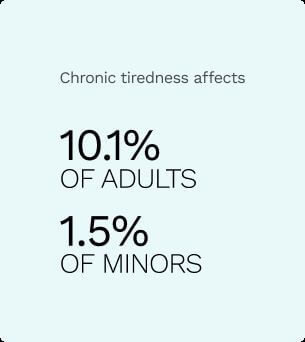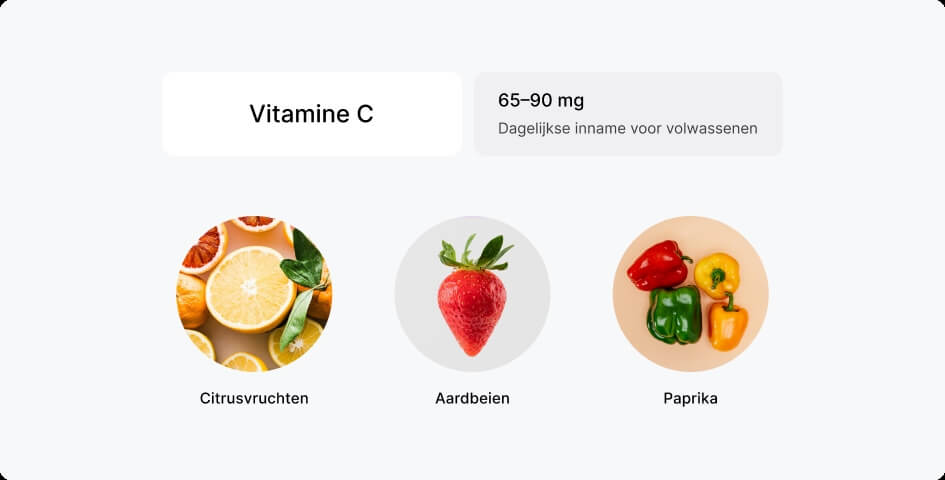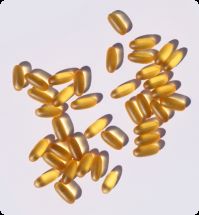Imagine waking up each day feeling like you barely slept, even though you clocked in a full eight hours. You push through your routines, but something’s off—you’re running on low energy, and even coffee doesn’t seem to lift the fog. If this is your story, you’re not alone. Chronic tiredness affects about 10.1% of adults and 1.5% of minors today.


For many, chronic tiredness can be traced back to something overlooked but essential: vitamins. While diet, lifestyle, and stress play roles, specific vitamin deficiencies can lead to lingering fatigue that no amount of rest seems to cure.
This article will explore what deficiency causes tiredness and how vitamins connect to energy. Read on!
What Vitamin Deficiency Causes Fatigue and Tiredness?
Fatigue is one of the first signs your body is missing out on essential nutrients. But what deficiency causes fatigue? It’s certainly not just any vitamins — there are specific ones that when in short supply, cause that relentless, bone-deep tiredness. Vitamins B12, D, C, and B6 are the usual suspects. When these nutrients are low, your body struggles to maintain energy levels, leaving you feeling drained and demotivated.
Can you be very tired from a vitamin D deficiency?
Vitamin D is essential for bone health, immune function, and, perhaps most importantly, energy metabolism. When Vitamin D is low, your cells struggle to convert food into energy efficiently, leaving you feeling sluggish and depleted.
Low levels of Vitamin D can lead to muscle weakness, frequent colds, or even sadness. Many people with Vitamin D deficiency don’t realize it because symptoms are often subtle or mistaken for other issues. For instance, those in colder or less sunny climates and people who spend much time indoors are particularly at risk. Individuals with darker skin may also produce less Vitamin D from sunlight due to higher melanin levels, which naturally limits sun absorption.


Recommended daily intake and sources:
The recommended daily intake for adults is around 600-800 IU, found in foods like fatty fish, eggs, and fortified dairy products. For those who struggle to get enough sunlight, supplements may help to restore balance and bring back that essential spark.

Vitamin B12: The brain-boosting essential
Vitamin B12 is a powerhouse nutrient in red blood cell production, DNA synthesis, and neurological function. If you’ve ever experienced numbness in your hands or feet or find it hard to stay mentally sharp, you might need more B12 in your diet.
B12 deficiency is common among vegetarians and vegans since it’s primarily found in animal products. Though some foods like nutritional yeast or fortified plant milk contain B12, supplements for those with plant-based diets are worth considering.
Additionally, individuals who have undergone weight-loss surgery or those with conditions like pernicious anemia may struggle to absorb this vitamin efficiently. Even medications like metformin, used for diabetes, can lower B12 levels. Symptoms of deficiency can be subtle or sudden, ranging from numbness in the extremities to balance issues, a swollen tongue, and even cognitive difficulties.



Recommended daily intake and sources:
Adults need around 2.4 mcg of B12 daily, found in foods like fish, chicken, and yogurt. For those with plant-based diets, fortified foods or supplements can help, but if B12 levels are severely low, a healthcare provider can guide you in finding the best way to boost them.

Vitamin B6: A multitasker for brain and immune health
Vitamin B6 helps the body convert food into energy, and it supports brain function and the immune system. This vitamin is also essential for producing serotonin, a mood-regulating hormone. Deficiency in B6 can contribute to mental fog and even depression.
Without enough B6, you may find that even simple tasks seem to drain you, and that cloud of fatigue can become a permanent fixture. Symptoms of a deficiency might also include irritability, confusion, and, in some cases, weakened immunity. Additionally, alcohol dependence can also interfere with B6 absorption, making it essential to monitor levels closely.
![{"type":"elementor","siteurl":"https://www.easly.nl/wp-json/","elements":[{"id":"fe8aebd","elType":"section","isInner":"","isLocked":false,"settings":{"layout":"full_width","structure":"20","margin":{"unit":"px","top":"32","right":0,"bottom":"0","left":0,"isLinked":""},"_title":"","content_width":{"unit":"px","size":"","sizes":[]},"content_width_tablet":{"unit":"px","size":"","sizes":[]},"content_width_mobile":{"unit":"px","size":"","sizes":[]},"gap":"default","gap_columns_custom":{"unit":"px","size":"","sizes":[]},"gap_columns_custom_tablet":{"unit":"px","size":"","sizes":[]},"gap_columns_custom_mobile":{"unit":"px","size":"","sizes":[]},"height":"default","custom_height":{"unit":"px","size":400,"sizes":[]},"custom_height_tablet":{"unit":"px","size":"","sizes":[]},"custom_height_mobile":{"unit":"px","size":"","sizes":[]},"column_position":"middle","content_position":"","overflow":"","stretch_section":"","html_tag":"","background_background":"","background_color":"","background_color_stop":{"unit":"%","size":0,"sizes":[]},"background_color_stop_tablet":{"unit":"%","size":"","sizes":[]},"background_color_stop_mobile":{"unit":"%","size":"","sizes":[]},"background_color_b":"#f2295b","background_color_b_stop":{"unit":"%","size":100,"sizes":[]},"background_color_b_stop_tablet":{"unit":"%","size":"","sizes":[]},"background_color_b_stop_mobile":{"unit":"%","size":"","sizes":[]},"background_gradient_type":"linear","background_gradient_angle":{"unit":"deg","size":180,"sizes":[]},"background_gradient_angle_tablet":{"unit":"deg","size":"","sizes":[]},"background_gradient_angle_mobile":{"unit":"deg","size":"","sizes":[]},"background_gradient_position":"center center","background_gradient_position_tablet":"center center","background_gradient_position_mobile":"center center","background_image":{"url":"","id":"","size":""},"background_image_tablet":{"url":"","id":"","size":""},"background_image_mobile":{"url":"","id":"","size":""},"background_position":"","background_position_tablet":"","background_position_mobile":"","background_xpos":{"unit":"px","size":0,"sizes":[]},"background_xpos_tablet":{"unit":"px","size":0,"sizes":[]},"background_xpos_mobile":{"unit":"px","size":0,"sizes":[]},"background_ypos":{"unit":"px","size":0,"sizes":[]},"background_ypos_tablet":{"unit":"px","size":0,"sizes":[]},"background_ypos_mobile":{"unit":"px","size":0,"sizes":[]},"background_attachment":"","background_repeat":"","background_repeat_tablet":"","background_repeat_mobile":"","background_size":"","background_size_tablet":"","background_size_mobile":"","background_bg_width":{"unit":"%","size":100,"sizes":[]},"background_bg_width_tablet":{"unit":"px","size":"","sizes":[]},"background_bg_width_mobile":{"unit":"px","size":"","sizes":[]},"background_motion_fx_motion_fx_scrolling":"","background_motion_fx_translateY_effect":"","background_motion_fx_translateY_direction":"","background_motion_fx_translateY_speed":{"unit":"px","size":4,"sizes":[]},"background_motion_fx_translateY_affectedRange":{"unit":"%","size":"","sizes":{"start":0,"end":100}},"background_motion_fx_translateX_effect":"","background_motion_fx_translateX_direction":"","background_motion_fx_translateX_speed":{"unit":"px","size":4,"sizes":[]},"background_motion_fx_translateX_affectedRange":{"unit":"%","size":"","sizes":{"start":0,"end":100}},"background_motion_fx_opacity_effect":"","background_motion_fx_opacity_direction":"out-in","background_motion_fx_opacity_level":{"unit":"px","size":10,"sizes":[]},"background_motion_fx_opacity_range":{"unit":"%","size":"","sizes":{"start":20,"end":80}},"background_motion_fx_blur_effect":"","background_motion_fx_blur_direction":"out-in","background_motion_fx_blur_level":{"unit":"px","size":7,"sizes":[]},"background_motion_fx_blur_range":{"unit":"%","size":"","sizes":{"start":20,"end":80}},"background_motion_fx_rotateZ_direction":"","background_motion_fx_rotateZ_speed":{"unit":"px","size":1,"sizes":[]},"background_motion_fx_rotateZ_affectedRange":{"unit":"%","size":"","sizes":{"start":0,"end":100}},"background_motion_fx_scale_effect":"","background_motion_fx_scale_direction":"out-in","background_motion_fx_scale_speed":{"unit":"px","size":4,"sizes":[]},"background_motion_fx_scale_range":{"unit":"%","size":"","sizes":{"start":20,"end":80}},"background_motion_fx_devices":["desktop","tablet","mobile"],"background_motion_fx_range":"","background_motion_fx_motion_fx_mouse":"","background_motion_fx_mouseTrack_effect":"","background_motion_fx_mouseTrack_direction":"","background_motion_fx_mouseTrack_speed":{"unit":"px","size":1,"sizes":[]},"background_motion_fx_tilt_direction":"","background_motion_fx_tilt_speed":{"unit":"px","size":4,"sizes":[]},"background_video_link":"","background_video_start":"","background_video_end":"","background_play_once":"","background_play_on_mobile":"","background_privacy_mode":"","background_video_fallback":{"url":"","id":"","size":""},"background_slideshow_gallery":[],"background_slideshow_loop":"yes","background_slideshow_slide_duration":5000,"background_slideshow_slide_transition":"fade","background_slideshow_transition_duration":500,"background_slideshow_background_size":"","background_slideshow_background_size_tablet":"","background_slideshow_background_size_mobile":"","background_slideshow_background_position":"","background_slideshow_background_position_tablet":"","background_slideshow_background_position_mobile":"","background_slideshow_lazyload":"","background_slideshow_ken_burns":"","background_slideshow_ken_burns_zoom_direction":"in","background_hover_background":"","background_hover_color":"","background_hover_color_stop":{"unit":"%","size":0,"sizes":[]},"background_hover_color_stop_tablet":{"unit":"%","size":"","sizes":[]},"background_hover_color_stop_mobile":{"unit":"%","size":"","sizes":[]},"background_hover_color_b":"#f2295b","background_hover_color_b_stop":{"unit":"%","size":100,"sizes":[]},"background_hover_color_b_stop_tablet":{"unit":"%","size":"","sizes":[]},"background_hover_color_b_stop_mobile":{"unit":"%","size":"","sizes":[]},"background_hover_gradient_type":"linear","background_hover_gradient_angle":{"unit":"deg","size":180,"sizes":[]},"background_hover_gradient_angle_tablet":{"unit":"deg","size":"","sizes":[]},"background_hover_gradient_angle_mobile":{"unit":"deg","size":"","sizes":[]},"background_hover_gradient_position":"center center","background_hover_gradient_position_tablet":"center center","background_hover_gradient_position_mobile":"center center","background_hover_image":{"url":"","id":"","size":""},"background_hover_image_tablet":{"url":"","id":"","size":""},"background_hover_image_mobile":{"url":"","id":"","size":""},"background_hover_position":"","background_hover_position_tablet":"","background_hover_position_mobile":"","background_hover_xpos":{"unit":"px","size":0,"sizes":[]},"background_hover_xpos_tablet":{"unit":"px","size":0,"sizes":[]},"background_hover_xpos_mobile":{"unit":"px","size":0,"sizes":[]},"background_hover_ypos":{"unit":"px","size":0,"sizes":[]},"background_hover_ypos_tablet":{"unit":"px","size":0,"sizes":[]},"background_hover_ypos_mobile":{"unit":"px","size":0,"sizes":[]},"background_hover_attachment":"","background_hover_repeat":"","background_hover_repeat_tablet":"","background_hover_repeat_mobile":"","background_hover_size":"","background_hover_size_tablet":"","background_hover_size_mobile":"","background_hover_bg_width":{"unit":"%","size":100,"sizes":[]},"background_hover_bg_width_tablet":{"unit":"px","size":"","sizes":[]},"background_hover_bg_width_mobile":{"unit":"px","size":"","sizes":[]},"background_hover_video_link":"","background_hover_video_start":"","background_hover_video_end":"","background_hover_play_once":"","background_hover_play_on_mobile":"","background_hover_privacy_mode":"","background_hover_video_fallback":{"url":"","id":"","size":""},"background_hover_slideshow_gallery":[],"background_hover_slideshow_loop":"yes","background_hover_slideshow_slide_duration":5000,"background_hover_slideshow_slide_transition":"fade","background_hover_slideshow_transition_duration":500,"background_hover_slideshow_background_size":"","background_hover_slideshow_background_size_tablet":"","background_hover_slideshow_background_size_mobile":"","background_hover_slideshow_background_position":"","background_hover_slideshow_background_position_tablet":"","background_hover_slideshow_background_position_mobile":"","background_hover_slideshow_lazyload":"","background_hover_slideshow_ken_burns":"","background_hover_slideshow_ken_burns_zoom_direction":"in","background_hover_transition":{"unit":"px","size":0.3,"sizes":[]},"background_overlay_background":"","background_overlay_color":"","background_overlay_color_stop":{"unit":"%","size":0,"sizes":[]},"background_overlay_color_stop_tablet":{"unit":"%","size":"","sizes":[]},"background_overlay_color_stop_mobile":{"unit":"%","size":"","sizes":[]},"background_overlay_color_b":"#f2295b","background_overlay_color_b_stop":{"unit":"%","size":100,"sizes":[]},"background_overlay_color_b_stop_tablet":{"unit":"%","size":"","sizes":[]},"background_overlay_color_b_stop_mobile":{"unit":"%","size":"","sizes":[]},"background_overlay_gradient_type":"linear","background_overlay_gradient_angle":{"unit":"deg","size":180,"sizes":[]},"background_overlay_gradient_angle_tablet":{"unit":"deg","size":"","sizes":[]},"background_overlay_gradient_angle_mobile":{"unit":"deg","size":"","sizes":[]},"background_overlay_gradient_position":"center center","background_overlay_gradient_position_tablet":"center center","background_overlay_gradient_position_mobile":"center center","background_overlay_image":{"url":"","id":"","size":""},"background_overlay_image_tablet":{"url":"","id":"","size":""},"background_overlay_image_mobile":{"url":"","id":"","size":""},"background_overlay_position":"","background_overlay_position_tablet":"","background_overlay_position_mobile":"","background_overlay_xpos":{"unit":"px","size":0,"sizes":[]},"background_overlay_xpos_tablet":{"unit":"px","size":0,"sizes":[]},"background_overlay_xpos_mobile":{"unit":"px","size":0,"sizes":[]},"background_overlay_ypos":{"unit":"px","size":0,"sizes":[]},"background_overlay_ypos_tablet":{"unit":"px","size":0,"sizes":[]},"background_overlay_ypos_mobile":{"unit":"px","size":0,"sizes":[]},"background_overlay_attachment":"","background_overlay_repeat":"","background_overlay_repeat_tablet":"","background_overlay_repeat_mobile":"","background_overlay_size":"","background_overlay_size_tablet":"","background_overlay_size_mobile":"","background_overlay_bg_width":{"unit":"%","size":100,"sizes":[]},"background_overlay_bg_width_tablet":{"unit":"px","size":"","sizes":[]},"background_overlay_bg_width_mobile":{"unit":"px","size":"","sizes":[]},"background_overlay_video_link":"","background_overlay_video_start":"","background_overlay_video_end":"","background_overlay_play_once":"","background_overlay_play_on_mobile":"","background_overlay_privacy_mode":"","background_overlay_video_fallback":{"url":"","id":"","size":""},"background_overlay_slideshow_gallery":[],"background_overlay_slideshow_loop":"yes","background_overlay_slideshow_slide_duration":5000,"background_overlay_slideshow_slide_transition":"fade","background_overlay_slideshow_transition_duration":500,"background_overlay_slideshow_background_size":"","background_overlay_slideshow_background_size_tablet":"","background_overlay_slideshow_background_size_mobile":"","background_overlay_slideshow_background_position":"","background_overlay_slideshow_background_position_tablet":"","background_overlay_slideshow_background_position_mobile":"","background_overlay_slideshow_lazyload":"","background_overlay_slideshow_ken_burns":"","background_overlay_slideshow_ken_burns_zoom_direction":"in","background_overlay_opacity":{"unit":"px","size":0.5,"sizes":[]},"background_overlay_opacity_tablet":{"unit":"px","size":"","sizes":[]},"background_overlay_opacity_mobile":{"unit":"px","size":"","sizes":[]},"css_filters_css_filter":"","css_filters_blur":{"unit":"px","size":0,"sizes":[]},"css_filters_brightness":{"unit":"px","size":100,"sizes":[]},"css_filters_contrast":{"unit":"px","size":100,"sizes":[]},"css_filters_saturate":{"unit":"px","size":100,"sizes":[]},"css_filters_hue":{"unit":"px","size":0,"sizes":[]},"overlay_blend_mode":"","background_overlay_hover_background":"","background_overlay_hover_color":"","background_overlay_hover_color_stop":{"unit":"%","size":0,"sizes":[]},"background_overlay_hover_color_stop_tablet":{"unit":"%","size":"","sizes":[]},"background_overlay_hover_color_stop_mobile":{"unit":"%","size":"","sizes":[]},"background_overlay_hover_color_b":"#f2295b","background_overlay_hover_color_b_stop":{"unit":"%","size":100,"sizes":[]},"background_overlay_hover_color_b_stop_tablet":{"unit":"%","size":"","sizes":[]},"background_overlay_hover_color_b_stop_mobile":{"unit":"%","size":"","sizes":[]},"background_overlay_hover_gradient_type":"linear","background_overlay_hover_gradient_angle":{"unit":"deg","size":180,"sizes":[]},"background_overlay_hover_gradient_angle_tablet":{"unit":"deg","size":"","sizes":[]},"background_overlay_hover_gradient_angle_mobile":{"unit":"deg","size":"","sizes":[]},"background_overlay_hover_gradient_position":"center center","background_overlay_hover_gradient_position_tablet":"center center","background_overlay_hover_gradient_position_mobile":"center center","background_overlay_hover_image":{"url":"","id":"","size":""},"background_overlay_hover_image_tablet":{"url":"","id":"","size":""},"background_overlay_hover_image_mobile":{"url":"","id":"","size":""},"background_overlay_hover_position":"","background_overlay_hover_position_tablet":"","background_overlay_hover_position_mobile":"","background_overlay_hover_xpos":{"unit":"px","size":0,"sizes":[]},"background_overlay_hover_xpos_tablet":{"unit":"px","size":0,"sizes":[]},"background_overlay_hover_xpos_mobile":{"unit":"px","size":0,"sizes":[]},"background_overlay_hover_ypos":{"unit":"px","size":0,"sizes":[]},"background_overlay_hover_ypos_tablet":{"unit":"px","size":0,"sizes":[]},"background_overlay_hover_ypos_mobile":{"unit":"px","size":0,"sizes":[]},"background_overlay_hover_attachment":"","background_overlay_hover_repeat":"","background_overlay_hover_repeat_tablet":"","background_overlay_hover_repeat_mobile":"","background_overlay_hover_size":"","background_overlay_hover_size_tablet":"","background_overlay_hover_size_mobile":"","background_overlay_hover_bg_width":{"unit":"%","size":100,"sizes":[]},"background_overlay_hover_bg_width_tablet":{"unit":"px","size":"","sizes":[]},"background_overlay_hover_bg_width_mobile":{"unit":"px","size":"","sizes":[]},"background_overlay_hover_video_link":"","background_overlay_hover_video_start":"","background_overlay_hover_video_end":"","background_overlay_hover_play_once":"","background_overlay_hover_play_on_mobile":"","background_overlay_hover_privacy_mode":"","background_overlay_hover_video_fallback":{"url":"","id":"","size":""},"background_overlay_hover_slideshow_gallery":[],"background_overlay_hover_slideshow_loop":"yes","background_overlay_hover_slideshow_slide_duration":5000,"background_overlay_hover_slideshow_slide_transition":"fade","background_overlay_hover_slideshow_transition_duration":500,"background_overlay_hover_slideshow_background_size":"","background_overlay_hover_slideshow_background_size_tablet":"","background_overlay_hover_slideshow_background_size_mobile":"","background_overlay_hover_slideshow_background_position":"","background_overlay_hover_slideshow_background_position_tablet":"","background_overlay_hover_slideshow_background_position_mobile":"","background_overlay_hover_slideshow_lazyload":"","background_overlay_hover_slideshow_ken_burns":"","background_overlay_hover_slideshow_ken_burns_zoom_direction":"in","background_overlay_hover_opacity":{"unit":"px","size":0.5,"sizes":[]},"background_overlay_hover_opacity_tablet":{"unit":"px","size":"","sizes":[]},"background_overlay_hover_opacity_mobile":{"unit":"px","size":"","sizes":[]},"css_filters_hover_css_filter":"","css_filters_hover_blur":{"unit":"px","size":0,"sizes":[]},"css_filters_hover_brightness":{"unit":"px","size":100,"sizes":[]},"css_filters_hover_contrast":{"unit":"px","size":100,"sizes":[]},"css_filters_hover_saturate":{"unit":"px","size":100,"sizes":[]},"css_filters_hover_hue":{"unit":"px","size":0,"sizes":[]},"background_overlay_hover_transition":{"unit":"px","size":0.3,"sizes":[]},"border_border":"","border_width":{"unit":"px","top":"","right":"","bottom":"","left":"","isLinked":true},"border_width_tablet":{"unit":"px","top":"","right":"","bottom":"","left":"","isLinked":true},"border_width_mobile":{"unit":"px","top":"","right":"","bottom":"","left":"","isLinked":true},"border_color":"","border_radius":{"unit":"px","top":"","right":"","bottom":"","left":"","isLinked":true},"border_radius_tablet":{"unit":"px","top":"","right":"","bottom":"","left":"","isLinked":true},"border_radius_mobile":{"unit":"px","top":"","right":"","bottom":"","left":"","isLinked":true},"box_shadow_box_shadow_type":"","box_shadow_box_shadow":{"horizontal":0,"vertical":0,"blur":10,"spread":0,"color":"rgba(0,0,0,0.5)"},"box_shadow_box_shadow_position":" ","border_hover_border":"","border_hover_width":{"unit":"px","top":"","right":"","bottom":"","left":"","isLinked":true},"border_hover_width_tablet":{"unit":"px","top":"","right":"","bottom":"","left":"","isLinked":true},"border_hover_width_mobile":{"unit":"px","top":"","right":"","bottom":"","left":"","isLinked":true},"border_hover_color":"","border_radius_hover":{"unit":"px","top":"","right":"","bottom":"","left":"","isLinked":true},"border_radius_hover_tablet":{"unit":"px","top":"","right":"","bottom":"","left":"","isLinked":true},"border_radius_hover_mobile":{"unit":"px","top":"","right":"","bottom":"","left":"","isLinked":true},"box_shadow_hover_box_shadow_type":"","box_shadow_hover_box_shadow":{"horizontal":0,"vertical":0,"blur":10,"spread":0,"color":"rgba(0,0,0,0.5)"},"box_shadow_hover_box_shadow_position":" ","border_hover_transition":{"unit":"px","size":0.3,"sizes":[]},"shape_divider_top":"","shape_divider_top_color":"","shape_divider_top_width":{"unit":"%","size":"","sizes":[]},"shape_divider_top_width_tablet":{"unit":"%","size":"","sizes":[]},"shape_divider_top_width_mobile":{"unit":"%","size":"","sizes":[]},"shape_divider_top_height":{"unit":"px","size":"","sizes":[]},"shape_divider_top_height_tablet":{"unit":"px","size":"","sizes":[]},"shape_divider_top_height_mobile":{"unit":"px","size":"","sizes":[]},"shape_divider_top_flip":"","shape_divider_top_negative":"","shape_divider_top_above_content":"","shape_divider_bottom":"","shape_divider_bottom_color":"","shape_divider_bottom_width":{"unit":"%","size":"","sizes":[]},"shape_divider_bottom_width_tablet":{"unit":"%","size":"","sizes":[]},"shape_divider_bottom_width_mobile":{"unit":"%","size":"","sizes":[]},"shape_divider_bottom_height":{"unit":"px","size":"","sizes":[]},"shape_divider_bottom_height_tablet":{"unit":"px","size":"","sizes":[]},"shape_divider_bottom_height_mobile":{"unit":"px","size":"","sizes":[]},"shape_divider_bottom_flip":"","shape_divider_bottom_negative":"","shape_divider_bottom_above_content":"","heading_color":"","color_text":"","color_link":"","color_link_hover":"","text_align":"","text_align_tablet":"","text_align_mobile":"","margin_tablet":{"unit":"px","top":"","right":"","bottom":"","left":"","isLinked":true},"margin_mobile":{"unit":"px","top":"","right":"","bottom":"","left":"","isLinked":true},"padding":{"unit":"px","top":"","right":"","bottom":"","left":"","isLinked":true},"padding_tablet":{"unit":"px","top":"","right":"","bottom":"","left":"","isLinked":true},"padding_mobile":{"unit":"px","top":"","right":"","bottom":"","left":"","isLinked":true},"z_index":"","z_index_tablet":"","z_index_mobile":"","_element_id":"","css_classes":"","e_display_conditions":"","motion_fx_motion_fx_scrolling":"","motion_fx_translateY_effect":"","motion_fx_translateY_direction":"","motion_fx_translateY_speed":{"unit":"px","size":4,"sizes":[]},"motion_fx_translateY_affectedRange":{"unit":"%","size":"","sizes":{"start":0,"end":100}},"motion_fx_translateX_effect":"","motion_fx_translateX_direction":"","motion_fx_translateX_speed":{"unit":"px","size":4,"sizes":[]},"motion_fx_translateX_affectedRange":{"unit":"%","size":"","sizes":{"start":0,"end":100}},"motion_fx_opacity_effect":"","motion_fx_opacity_direction":"out-in","motion_fx_opacity_level":{"unit":"px","size":10,"sizes":[]},"motion_fx_opacity_range":{"unit":"%","size":"","sizes":{"start":20,"end":80}},"motion_fx_blur_effect":"","motion_fx_blur_direction":"out-in","motion_fx_blur_level":{"unit":"px","size":7,"sizes":[]},"motion_fx_blur_range":{"unit":"%","size":"","sizes":{"start":20,"end":80}},"motion_fx_rotateZ_effect":"","motion_fx_rotateZ_direction":"","motion_fx_rotateZ_speed":{"unit":"px","size":1,"sizes":[]},"motion_fx_rotateZ_affectedRange":{"unit":"%","size":"","sizes":{"start":0,"end":100}},"motion_fx_scale_effect":"","motion_fx_scale_direction":"out-in","motion_fx_scale_speed":{"unit":"px","size":4,"sizes":[]},"motion_fx_scale_range":{"unit":"%","size":"","sizes":{"start":20,"end":80}},"motion_fx_transform_origin_x":"center","motion_fx_transform_origin_y":"center","motion_fx_devices":["desktop","tablet","mobile"],"motion_fx_range":"","motion_fx_mouseTrack_effect":"","motion_fx_mouseTrack_direction":"","motion_fx_mouseTrack_speed":{"unit":"px","size":1,"sizes":[]},"motion_fx_tilt_effect":"","motion_fx_tilt_direction":"","motion_fx_tilt_speed":{"unit":"px","size":4,"sizes":[]},"sticky":"","sticky_on":["desktop","tablet","mobile"],"sticky_offset":0,"sticky_offset_tablet":"","sticky_offset_mobile":"","sticky_effects_offset":0,"sticky_effects_offset_tablet":"","sticky_effects_offset_mobile":"","sticky_parent":"","animation":"","animation_tablet":"","animation_mobile":"","animation_duration":"","animation_delay":"","reverse_order_tablet":"","reverse_order_mobile":"","hide_desktop":"","hide_tablet":"","hide_mobile":"","_attributes":"","custom_css":""},"defaultEditSettings":{"defaultEditRoute":"content"},"elements":[{"id":"6d73123","elType":"column","isInner":"","isLocked":false,"settings":{"_column_size":"50","_title":"","_inline_size":"","_inline_size_tablet":"","_inline_size_mobile":"","content_position":"","content_position_tablet":"","content_position_mobile":"","align":"","align_tablet":"","align_mobile":"","space_between_widgets":"","space_between_widgets_tablet":"","space_between_widgets_mobile":"","html_tag":"","background_background":"","background_color":"","background_color_stop":{"unit":"%","size":0,"sizes":[]},"background_color_stop_tablet":{"unit":"%","size":"","sizes":[]},"background_color_stop_mobile":{"unit":"%","size":"","sizes":[]},"background_color_b":"#f2295b","background_color_b_stop":{"unit":"%","size":100,"sizes":[]},"background_color_b_stop_tablet":{"unit":"%","size":"","sizes":[]},"background_color_b_stop_mobile":{"unit":"%","size":"","sizes":[]},"background_gradient_type":"linear","background_gradient_angle":{"unit":"deg","size":180,"sizes":[]},"background_gradient_angle_tablet":{"unit":"deg","size":"","sizes":[]},"background_gradient_angle_mobile":{"unit":"deg","size":"","sizes":[]},"background_gradient_position":"center center","background_gradient_position_tablet":"center center","background_gradient_position_mobile":"center center","background_image":{"url":"","id":"","size":""},"background_image_tablet":{"url":"","id":"","size":""},"background_image_mobile":{"url":"","id":"","size":""},"background_position":"","background_position_tablet":"","background_position_mobile":"","background_xpos":{"unit":"px","size":0,"sizes":[]},"background_xpos_tablet":{"unit":"px","size":0,"sizes":[]},"background_xpos_mobile":{"unit":"px","size":0,"sizes":[]},"background_ypos":{"unit":"px","size":0,"sizes":[]},"background_ypos_tablet":{"unit":"px","size":0,"sizes":[]},"background_ypos_mobile":{"unit":"px","size":0,"sizes":[]},"background_attachment":"","background_repeat":"","background_repeat_tablet":"","background_repeat_mobile":"","background_size":"","background_size_tablet":"","background_size_mobile":"","background_bg_width":{"unit":"%","size":100,"sizes":[]},"background_bg_width_tablet":{"unit":"px","size":"","sizes":[]},"background_bg_width_mobile":{"unit":"px","size":"","sizes":[]},"background_motion_fx_motion_fx_scrolling":"","background_motion_fx_translateY_effect":"","background_motion_fx_translateY_direction":"","background_motion_fx_translateY_speed":{"unit":"px","size":4,"sizes":[]},"background_motion_fx_translateY_affectedRange":{"unit":"%","size":"","sizes":{"start":0,"end":100}},"background_motion_fx_translateX_effect":"","background_motion_fx_translateX_direction":"","background_motion_fx_translateX_speed":{"unit":"px","size":4,"sizes":[]},"background_motion_fx_translateX_affectedRange":{"unit":"%","size":"","sizes":{"start":0,"end":100}},"background_motion_fx_opacity_effect":"","background_motion_fx_opacity_direction":"out-in","background_motion_fx_opacity_level":{"unit":"px","size":10,"sizes":[]},"background_motion_fx_opacity_range":{"unit":"%","size":"","sizes":{"start":20,"end":80}},"background_motion_fx_blur_effect":"","background_motion_fx_blur_direction":"out-in","background_motion_fx_blur_level":{"unit":"px","size":7,"sizes":[]},"background_motion_fx_blur_range":{"unit":"%","size":"","sizes":{"start":20,"end":80}},"background_motion_fx_rotateZ_direction":"","background_motion_fx_rotateZ_speed":{"unit":"px","size":1,"sizes":[]},"background_motion_fx_rotateZ_affectedRange":{"unit":"%","size":"","sizes":{"start":0,"end":100}},"background_motion_fx_scale_effect":"","background_motion_fx_scale_direction":"out-in","background_motion_fx_scale_speed":{"unit":"px","size":4,"sizes":[]},"background_motion_fx_scale_range":{"unit":"%","size":"","sizes":{"start":20,"end":80}},"background_motion_fx_devices":["desktop","tablet","mobile"],"background_motion_fx_range":"","background_motion_fx_motion_fx_mouse":"","background_motion_fx_mouseTrack_effect":"","background_motion_fx_mouseTrack_direction":"","background_motion_fx_mouseTrack_speed":{"unit":"px","size":1,"sizes":[]},"background_motion_fx_tilt_direction":"","background_motion_fx_tilt_speed":{"unit":"px","size":4,"sizes":[]},"background_video_link":"","background_video_start":"","background_video_end":"","background_play_once":"","background_play_on_mobile":"","background_privacy_mode":"","background_video_fallback":{"url":"","id":"","size":""},"background_slideshow_gallery":[],"background_slideshow_loop":"yes","background_slideshow_slide_duration":5000,"background_slideshow_slide_transition":"fade","background_slideshow_transition_duration":500,"background_slideshow_background_size":"","background_slideshow_background_size_tablet":"","background_slideshow_background_size_mobile":"","background_slideshow_background_position":"","background_slideshow_background_position_tablet":"","background_slideshow_background_position_mobile":"","background_slideshow_lazyload":"","background_slideshow_ken_burns":"","background_slideshow_ken_burns_zoom_direction":"in","background_hover_background":"","background_hover_color":"","background_hover_color_stop":{"unit":"%","size":0,"sizes":[]},"background_hover_color_stop_tablet":{"unit":"%","size":"","sizes":[]},"background_hover_color_stop_mobile":{"unit":"%","size":"","sizes":[]},"background_hover_color_b":"#f2295b","background_hover_color_b_stop":{"unit":"%","size":100,"sizes":[]},"background_hover_color_b_stop_tablet":{"unit":"%","size":"","sizes":[]},"background_hover_color_b_stop_mobile":{"unit":"%","size":"","sizes":[]},"background_hover_gradient_type":"linear","background_hover_gradient_angle":{"unit":"deg","size":180,"sizes":[]},"background_hover_gradient_angle_tablet":{"unit":"deg","size":"","sizes":[]},"background_hover_gradient_angle_mobile":{"unit":"deg","size":"","sizes":[]},"background_hover_gradient_position":"center center","background_hover_gradient_position_tablet":"center center","background_hover_gradient_position_mobile":"center center","background_hover_image":{"url":"","id":"","size":""},"background_hover_image_tablet":{"url":"","id":"","size":""},"background_hover_image_mobile":{"url":"","id":"","size":""},"background_hover_position":"","background_hover_position_tablet":"","background_hover_position_mobile":"","background_hover_xpos":{"unit":"px","size":0,"sizes":[]},"background_hover_xpos_tablet":{"unit":"px","size":0,"sizes":[]},"background_hover_xpos_mobile":{"unit":"px","size":0,"sizes":[]},"background_hover_ypos":{"unit":"px","size":0,"sizes":[]},"background_hover_ypos_tablet":{"unit":"px","size":0,"sizes":[]},"background_hover_ypos_mobile":{"unit":"px","size":0,"sizes":[]},"background_hover_attachment":"","background_hover_repeat":"","background_hover_repeat_tablet":"","background_hover_repeat_mobile":"","background_hover_size":"","background_hover_size_tablet":"","background_hover_size_mobile":"","background_hover_bg_width":{"unit":"%","size":100,"sizes":[]},"background_hover_bg_width_tablet":{"unit":"px","size":"","sizes":[]},"background_hover_bg_width_mobile":{"unit":"px","size":"","sizes":[]},"background_hover_video_link":"","background_hover_video_start":"","background_hover_video_end":"","background_hover_play_once":"","background_hover_play_on_mobile":"","background_hover_privacy_mode":"","background_hover_video_fallback":{"url":"","id":"","size":""},"background_hover_slideshow_gallery":[],"background_hover_slideshow_loop":"yes","background_hover_slideshow_slide_duration":5000,"background_hover_slideshow_slide_transition":"fade","background_hover_slideshow_transition_duration":500,"background_hover_slideshow_background_size":"","background_hover_slideshow_background_size_tablet":"","background_hover_slideshow_background_size_mobile":"","background_hover_slideshow_background_position":"","background_hover_slideshow_background_position_tablet":"","background_hover_slideshow_background_position_mobile":"","background_hover_slideshow_lazyload":"","background_hover_slideshow_ken_burns":"","background_hover_slideshow_ken_burns_zoom_direction":"in","background_hover_transition":{"unit":"px","size":0.3,"sizes":[]},"background_overlay_background":"","background_overlay_color":"","background_overlay_color_stop":{"unit":"%","size":0,"sizes":[]},"background_overlay_color_stop_tablet":{"unit":"%","size":"","sizes":[]},"background_overlay_color_stop_mobile":{"unit":"%","size":"","sizes":[]},"background_overlay_color_b":"#f2295b","background_overlay_color_b_stop":{"unit":"%","size":100,"sizes":[]},"background_overlay_color_b_stop_tablet":{"unit":"%","size":"","sizes":[]},"background_overlay_color_b_stop_mobile":{"unit":"%","size":"","sizes":[]},"background_overlay_gradient_type":"linear","background_overlay_gradient_angle":{"unit":"deg","size":180,"sizes":[]},"background_overlay_gradient_angle_tablet":{"unit":"deg","size":"","sizes":[]},"background_overlay_gradient_angle_mobile":{"unit":"deg","size":"","sizes":[]},"background_overlay_gradient_position":"center center","background_overlay_gradient_position_tablet":"center center","background_overlay_gradient_position_mobile":"center center","background_overlay_image":{"url":"","id":"","size":""},"background_overlay_image_tablet":{"url":"","id":"","size":""},"background_overlay_image_mobile":{"url":"","id":"","size":""},"background_overlay_position":"","background_overlay_position_tablet":"","background_overlay_position_mobile":"","background_overlay_xpos":{"unit":"px","size":0,"sizes":[]},"background_overlay_xpos_tablet":{"unit":"px","size":0,"sizes":[]},"background_overlay_xpos_mobile":{"unit":"px","size":0,"sizes":[]},"background_overlay_ypos":{"unit":"px","size":0,"sizes":[]},"background_overlay_ypos_tablet":{"unit":"px","size":0,"sizes":[]},"background_overlay_ypos_mobile":{"unit":"px","size":0,"sizes":[]},"background_overlay_attachment":"","background_overlay_repeat":"","background_overlay_repeat_tablet":"","background_overlay_repeat_mobile":"","background_overlay_size":"","background_overlay_size_tablet":"","background_overlay_size_mobile":"","background_overlay_bg_width":{"unit":"%","size":100,"sizes":[]},"background_overlay_bg_width_tablet":{"unit":"px","size":"","sizes":[]},"background_overlay_bg_width_mobile":{"unit":"px","size":"","sizes":[]},"background_overlay_video_link":"","background_overlay_video_start":"","background_overlay_video_end":"","background_overlay_play_once":"","background_overlay_play_on_mobile":"","background_overlay_privacy_mode":"","background_overlay_video_fallback":{"url":"","id":"","size":""},"background_overlay_slideshow_gallery":[],"background_overlay_slideshow_loop":"yes","background_overlay_slideshow_slide_duration":5000,"background_overlay_slideshow_slide_transition":"fade","background_overlay_slideshow_transition_duration":500,"background_overlay_slideshow_background_size":"","background_overlay_slideshow_background_size_tablet":"","background_overlay_slideshow_background_size_mobile":"","background_overlay_slideshow_background_position":"","background_overlay_slideshow_background_position_tablet":"","background_overlay_slideshow_background_position_mobile":"","background_overlay_slideshow_lazyload":"","background_overlay_slideshow_ken_burns":"","background_overlay_slideshow_ken_burns_zoom_direction":"in","background_overlay_opacity":{"unit":"px","size":0.5,"sizes":[]},"background_overlay_opacity_tablet":{"unit":"px","size":"","sizes":[]},"background_overlay_opacity_mobile":{"unit":"px","size":"","sizes":[]},"css_filters_css_filter":"","css_filters_blur":{"unit":"px","size":0,"sizes":[]},"css_filters_brightness":{"unit":"px","size":100,"sizes":[]},"css_filters_contrast":{"unit":"px","size":100,"sizes":[]},"css_filters_saturate":{"unit":"px","size":100,"sizes":[]},"css_filters_hue":{"unit":"px","size":0,"sizes":[]},"overlay_blend_mode":"","background_overlay_hover_background":"","background_overlay_hover_color":"","background_overlay_hover_color_stop":{"unit":"%","size":0,"sizes":[]},"background_overlay_hover_color_stop_tablet":{"unit":"%","size":"","sizes":[]},"background_overlay_hover_color_stop_mobile":{"unit":"%","size":"","sizes":[]},"background_overlay_hover_color_b":"#f2295b","background_overlay_hover_color_b_stop":{"unit":"%","size":100,"sizes":[]},"background_overlay_hover_color_b_stop_tablet":{"unit":"%","size":"","sizes":[]},"background_overlay_hover_color_b_stop_mobile":{"unit":"%","size":"","sizes":[]},"background_overlay_hover_gradient_type":"linear","background_overlay_hover_gradient_angle":{"unit":"deg","size":180,"sizes":[]},"background_overlay_hover_gradient_angle_tablet":{"unit":"deg","size":"","sizes":[]},"background_overlay_hover_gradient_angle_mobile":{"unit":"deg","size":"","sizes":[]},"background_overlay_hover_gradient_position":"center center","background_overlay_hover_gradient_position_tablet":"center center","background_overlay_hover_gradient_position_mobile":"center center","background_overlay_hover_image":{"url":"","id":"","size":""},"background_overlay_hover_image_tablet":{"url":"","id":"","size":""},"background_overlay_hover_image_mobile":{"url":"","id":"","size":""},"background_overlay_hover_position":"","background_overlay_hover_position_tablet":"","background_overlay_hover_position_mobile":"","background_overlay_hover_xpos":{"unit":"px","size":0,"sizes":[]},"background_overlay_hover_xpos_tablet":{"unit":"px","size":0,"sizes":[]},"background_overlay_hover_xpos_mobile":{"unit":"px","size":0,"sizes":[]},"background_overlay_hover_ypos":{"unit":"px","size":0,"sizes":[]},"background_overlay_hover_ypos_tablet":{"unit":"px","size":0,"sizes":[]},"background_overlay_hover_ypos_mobile":{"unit":"px","size":0,"sizes":[]},"background_overlay_hover_attachment":"","background_overlay_hover_repeat":"","background_overlay_hover_repeat_tablet":"","background_overlay_hover_repeat_mobile":"","background_overlay_hover_size":"","background_overlay_hover_size_tablet":"","background_overlay_hover_size_mobile":"","background_overlay_hover_bg_width":{"unit":"%","size":100,"sizes":[]},"background_overlay_hover_bg_width_tablet":{"unit":"px","size":"","sizes":[]},"background_overlay_hover_bg_width_mobile":{"unit":"px","size":"","sizes":[]},"background_overlay_hover_video_link":"","background_overlay_hover_video_start":"","background_overlay_hover_video_end":"","background_overlay_hover_play_once":"","background_overlay_hover_play_on_mobile":"","background_overlay_hover_privacy_mode":"","background_overlay_hover_video_fallback":{"url":"","id":"","size":""},"background_overlay_hover_slideshow_gallery":[],"background_overlay_hover_slideshow_loop":"yes","background_overlay_hover_slideshow_slide_duration":5000,"background_overlay_hover_slideshow_slide_transition":"fade","background_overlay_hover_slideshow_transition_duration":500,"background_overlay_hover_slideshow_background_size":"","background_overlay_hover_slideshow_background_size_tablet":"","background_overlay_hover_slideshow_background_size_mobile":"","background_overlay_hover_slideshow_background_position":"","background_overlay_hover_slideshow_background_position_tablet":"","background_overlay_hover_slideshow_background_position_mobile":"","background_overlay_hover_slideshow_lazyload":"","background_overlay_hover_slideshow_ken_burns":"","background_overlay_hover_slideshow_ken_burns_zoom_direction":"in","background_overlay_hover_opacity":{"unit":"px","size":0.5,"sizes":[]},"background_overlay_hover_opacity_tablet":{"unit":"px","size":"","sizes":[]},"background_overlay_hover_opacity_mobile":{"unit":"px","size":"","sizes":[]},"css_filters_hover_css_filter":"","css_filters_hover_blur":{"unit":"px","size":0,"sizes":[]},"css_filters_hover_brightness":{"unit":"px","size":100,"sizes":[]},"css_filters_hover_contrast":{"unit":"px","size":100,"sizes":[]},"css_filters_hover_saturate":{"unit":"px","size":100,"sizes":[]},"css_filters_hover_hue":{"unit":"px","size":0,"sizes":[]},"background_overlay_hover_transition":{"unit":"px","size":0.3,"sizes":[]},"border_border":"","border_width":{"unit":"px","top":"","right":"","bottom":"","left":"","isLinked":true},"border_width_tablet":{"unit":"px","top":"","right":"","bottom":"","left":"","isLinked":true},"border_width_mobile":{"unit":"px","top":"","right":"","bottom":"","left":"","isLinked":true},"border_color":"","border_radius":{"unit":"px","top":"","right":"","bottom":"","left":"","isLinked":true},"border_radius_tablet":{"unit":"px","top":"","right":"","bottom":"","left":"","isLinked":true},"border_radius_mobile":{"unit":"px","top":"","right":"","bottom":"","left":"","isLinked":true},"box_shadow_box_shadow_type":"","box_shadow_box_shadow":{"horizontal":0,"vertical":0,"blur":10,"spread":0,"color":"rgba(0,0,0,0.5)"},"box_shadow_box_shadow_position":" ","border_hover_border":"","border_hover_width":{"unit":"px","top":"","right":"","bottom":"","left":"","isLinked":true},"border_hover_width_tablet":{"unit":"px","top":"","right":"","bottom":"","left":"","isLinked":true},"border_hover_width_mobile":{"unit":"px","top":"","right":"","bottom":"","left":"","isLinked":true},"border_hover_color":"","border_radius_hover":{"unit":"px","top":"","right":"","bottom":"","left":"","isLinked":true},"border_radius_hover_tablet":{"unit":"px","top":"","right":"","bottom":"","left":"","isLinked":true},"border_radius_hover_mobile":{"unit":"px","top":"","right":"","bottom":"","left":"","isLinked":true},"box_shadow_hover_box_shadow_type":"","box_shadow_hover_box_shadow":{"horizontal":0,"vertical":0,"blur":10,"spread":0,"color":"rgba(0,0,0,0.5)"},"box_shadow_hover_box_shadow_position":" ","border_hover_transition":{"unit":"px","size":0.3,"sizes":[]},"heading_color":"","color_text":"","color_link":"","color_link_hover":"","text_align":"","text_align_tablet":"","text_align_mobile":"","margin":{"unit":"px","top":"","right":"","bottom":"","left":"","isLinked":true},"margin_tablet":{"unit":"px","top":"","right":"","bottom":"","left":"","isLinked":true},"margin_mobile":{"unit":"px","top":"","right":"","bottom":"","left":"","isLinked":true},"padding":{"unit":"px","top":"","right":"","bottom":"","left":"","isLinked":true},"padding_tablet":{"unit":"px","top":"","right":"","bottom":"","left":"","isLinked":true},"padding_mobile":{"unit":"px","top":"","right":"","bottom":"","left":"","isLinked":true},"z_index":"","z_index_tablet":"","z_index_mobile":"","_element_id":"","css_classes":"","e_display_conditions":"","screen_sm":"","screen_sm_width":"","motion_fx_motion_fx_scrolling":"","motion_fx_translateY_effect":"","motion_fx_translateY_direction":"","motion_fx_translateY_speed":{"unit":"px","size":4,"sizes":[]},"motion_fx_translateY_affectedRange":{"unit":"%","size":"","sizes":{"start":0,"end":100}},"motion_fx_translateX_effect":"","motion_fx_translateX_direction":"","motion_fx_translateX_speed":{"unit":"px","size":4,"sizes":[]},"motion_fx_translateX_affectedRange":{"unit":"%","size":"","sizes":{"start":0,"end":100}},"motion_fx_opacity_effect":"","motion_fx_opacity_direction":"out-in","motion_fx_opacity_level":{"unit":"px","size":10,"sizes":[]},"motion_fx_opacity_range":{"unit":"%","size":"","sizes":{"start":20,"end":80}},"motion_fx_blur_effect":"","motion_fx_blur_direction":"out-in","motion_fx_blur_level":{"unit":"px","size":7,"sizes":[]},"motion_fx_blur_range":{"unit":"%","size":"","sizes":{"start":20,"end":80}},"motion_fx_rotateZ_effect":"","motion_fx_rotateZ_direction":"","motion_fx_rotateZ_speed":{"unit":"px","size":1,"sizes":[]},"motion_fx_rotateZ_affectedRange":{"unit":"%","size":"","sizes":{"start":0,"end":100}},"motion_fx_scale_effect":"","motion_fx_scale_direction":"out-in","motion_fx_scale_speed":{"unit":"px","size":4,"sizes":[]},"motion_fx_scale_range":{"unit":"%","size":"","sizes":{"start":20,"end":80}},"motion_fx_transform_origin_x":"center","motion_fx_transform_origin_y":"center","motion_fx_devices":["desktop","tablet","mobile"],"motion_fx_range":"","motion_fx_motion_fx_mouse":"","motion_fx_mouseTrack_effect":"","motion_fx_mouseTrack_direction":"","motion_fx_mouseTrack_speed":{"unit":"px","size":1,"sizes":[]},"motion_fx_tilt_effect":"","motion_fx_tilt_direction":"","motion_fx_tilt_speed":{"unit":"px","size":4,"sizes":[]},"animation":"","animation_tablet":"","animation_mobile":"","animation_duration":"","animation_delay":"","hide_desktop":"","hide_tablet":"","hide_mobile":"","_attributes":"","custom_css":""},"defaultEditSettings":{"defaultEditRoute":"content"},"elements":[{"id":"4b125fb","elType":"widget","isInner":false,"isLocked":false,"settings":{"image":{"url":"https://www.easly.nl/wp-content/uploads/sites/13/2024/11/Persoon-met-warme-kop-thee-in-zijn-handen.jpg","id":51652,"alt":"Persoon met warme kop thee in zijn handen","source":"library","size":""},"image_size":"full","image_border_radius":{"unit":"px","top":"8","right":"8","bottom":"8","left":"8","isLinked":"1"},"image_custom_dimension":{"width":"","height":""},"caption_source":"none","caption":"","link_to":"none","link":{"url":"","is_external":"","nofollow":"","custom_attributes":""},"open_lightbox":"default","align":"","align_tablet":"","align_mobile":"","width":{"unit":"%","size":"","sizes":[]},"width_tablet":{"unit":"%","size":"","sizes":[]},"width_mobile":{"unit":"%","size":"","sizes":[]},"space":{"unit":"%","size":"","sizes":[]},"space_tablet":{"unit":"%","size":"","sizes":[]},"space_mobile":{"unit":"%","size":"","sizes":[]},"height":{"unit":"px","size":"","sizes":[]},"height_tablet":{"unit":"px","size":"","sizes":[]},"height_mobile":{"unit":"px","size":"","sizes":[]},"object-fit":"","object-fit_tablet":"","object-fit_mobile":"","object-position":"center center","object-position_tablet":"","object-position_mobile":"","opacity":{"unit":"px","size":"","sizes":[]},"css_filters_css_filter":"","css_filters_blur":{"unit":"px","size":0,"sizes":[]},"css_filters_brightness":{"unit":"px","size":100,"sizes":[]},"css_filters_contrast":{"unit":"px","size":100,"sizes":[]},"css_filters_saturate":{"unit":"px","size":100,"sizes":[]},"css_filters_hue":{"unit":"px","size":0,"sizes":[]},"opacity_hover":{"unit":"px","size":"","sizes":[]},"css_filters_hover_css_filter":"","css_filters_hover_blur":{"unit":"px","size":0,"sizes":[]},"css_filters_hover_brightness":{"unit":"px","size":100,"sizes":[]},"css_filters_hover_contrast":{"unit":"px","size":100,"sizes":[]},"css_filters_hover_saturate":{"unit":"px","size":100,"sizes":[]},"css_filters_hover_hue":{"unit":"px","size":0,"sizes":[]},"background_hover_transition":{"unit":"px","size":"","sizes":[]},"hover_animation":"","image_border_border":"","image_border_width":{"unit":"px","top":"","right":"","bottom":"","left":"","isLinked":true},"image_border_width_tablet":{"unit":"px","top":"","right":"","bottom":"","left":"","isLinked":true},"image_border_width_mobile":{"unit":"px","top":"","right":"","bottom":"","left":"","isLinked":true},"image_border_color":"","image_border_radius_tablet":{"unit":"px","top":"","right":"","bottom":"","left":"","isLinked":true},"image_border_radius_mobile":{"unit":"px","top":"","right":"","bottom":"","left":"","isLinked":true},"image_box_shadow_box_shadow_type":"","image_box_shadow_box_shadow":{"horizontal":0,"vertical":0,"blur":10,"spread":0,"color":"rgba(0,0,0,0.5)"},"caption_align":"","caption_align_tablet":"","caption_align_mobile":"","text_color":"","caption_background_color":"","caption_typography_typography":"","caption_typography_font_family":"","caption_typography_font_size":{"unit":"px","size":"","sizes":[]},"caption_typography_font_size_tablet":{"unit":"px","size":"","sizes":[]},"caption_typography_font_size_mobile":{"unit":"px","size":"","sizes":[]},"caption_typography_font_weight":"","caption_typography_text_transform":"","caption_typography_font_style":"","caption_typography_text_decoration":"","caption_typography_line_height":{"unit":"px","size":"","sizes":[]},"caption_typography_line_height_tablet":{"unit":"em","size":"","sizes":[]},"caption_typography_line_height_mobile":{"unit":"em","size":"","sizes":[]},"caption_typography_letter_spacing":{"unit":"px","size":"","sizes":[]},"caption_typography_letter_spacing_tablet":{"unit":"px","size":"","sizes":[]},"caption_typography_letter_spacing_mobile":{"unit":"px","size":"","sizes":[]},"caption_typography_word_spacing":{"unit":"px","size":"","sizes":[]},"caption_typography_word_spacing_tablet":{"unit":"em","size":"","sizes":[]},"caption_typography_word_spacing_mobile":{"unit":"em","size":"","sizes":[]},"caption_text_shadow_text_shadow_type":"","caption_text_shadow_text_shadow":{"horizontal":0,"vertical":0,"blur":10,"color":"rgba(0,0,0,0.3)"},"caption_space":{"unit":"px","size":"","sizes":[]},"caption_space_tablet":{"unit":"px","size":"","sizes":[]},"caption_space_mobile":{"unit":"px","size":"","sizes":[]},"_title":"","_margin":{"unit":"px","top":"","right":"","bottom":"","left":"","isLinked":true},"_margin_tablet":{"unit":"px","top":"","right":"","bottom":"","left":"","isLinked":true},"_margin_mobile":{"unit":"px","top":"","right":"","bottom":"","left":"","isLinked":true},"_padding":{"unit":"px","top":"","right":"","bottom":"","left":"","isLinked":true},"_padding_tablet":{"unit":"px","top":"","right":"","bottom":"","left":"","isLinked":true},"_padding_mobile":{"unit":"px","top":"","right":"","bottom":"","left":"","isLinked":true},"_element_width":"","_element_width_tablet":"","_element_width_mobile":"","_element_custom_width":{"unit":"%","size":"","sizes":[]},"_element_custom_width_tablet":{"unit":"px","size":"","sizes":[]},"_element_custom_width_mobile":{"unit":"px","size":"","sizes":[]},"_element_vertical_align":"","_element_vertical_align_tablet":"","_element_vertical_align_mobile":"","_position":"","_offset_orientation_h":"start","_offset_x":{"unit":"px","size":0,"sizes":[]},"_offset_x_tablet":{"unit":"px","size":"","sizes":[]},"_offset_x_mobile":{"unit":"px","size":"","sizes":[]},"_offset_x_end":{"unit":"px","size":0,"sizes":[]},"_offset_x_end_tablet":{"unit":"px","size":"","sizes":[]},"_offset_x_end_mobile":{"unit":"px","size":"","sizes":[]},"_offset_orientation_v":"start","_offset_y":{"unit":"px","size":0,"sizes":[]},"_offset_y_tablet":{"unit":"px","size":"","sizes":[]},"_offset_y_mobile":{"unit":"px","size":"","sizes":[]},"_offset_y_end":{"unit":"px","size":0,"sizes":[]},"_offset_y_end_tablet":{"unit":"px","size":"","sizes":[]},"_offset_y_end_mobile":{"unit":"px","size":"","sizes":[]},"_z_index":"","_z_index_tablet":"","_z_index_mobile":"","_element_id":"","_css_classes":"","e_display_conditions":"","motion_fx_motion_fx_scrolling":"","motion_fx_translateY_effect":"","motion_fx_translateY_direction":"","motion_fx_translateY_speed":{"unit":"px","size":4,"sizes":[]},"motion_fx_translateY_affectedRange":{"unit":"%","size":"","sizes":{"start":0,"end":100}},"motion_fx_translateX_effect":"","motion_fx_translateX_direction":"","motion_fx_translateX_speed":{"unit":"px","size":4,"sizes":[]},"motion_fx_translateX_affectedRange":{"unit":"%","size":"","sizes":{"start":0,"end":100}},"motion_fx_opacity_effect":"","motion_fx_opacity_direction":"out-in","motion_fx_opacity_level":{"unit":"px","size":10,"sizes":[]},"motion_fx_opacity_range":{"unit":"%","size":"","sizes":{"start":20,"end":80}},"motion_fx_blur_effect":"","motion_fx_blur_direction":"out-in","motion_fx_blur_level":{"unit":"px","size":7,"sizes":[]},"motion_fx_blur_range":{"unit":"%","size":"","sizes":{"start":20,"end":80}},"motion_fx_rotateZ_effect":"","motion_fx_rotateZ_direction":"","motion_fx_rotateZ_speed":{"unit":"px","size":1,"sizes":[]},"motion_fx_rotateZ_affectedRange":{"unit":"%","size":"","sizes":{"start":0,"end":100}},"motion_fx_scale_effect":"","motion_fx_scale_direction":"out-in","motion_fx_scale_speed":{"unit":"px","size":4,"sizes":[]},"motion_fx_scale_range":{"unit":"%","size":"","sizes":{"start":20,"end":80}},"motion_fx_transform_origin_x":"center","motion_fx_transform_origin_y":"center","motion_fx_devices":["desktop","tablet","mobile"],"motion_fx_range":"","motion_fx_motion_fx_mouse":"","motion_fx_mouseTrack_effect":"","motion_fx_mouseTrack_direction":"","motion_fx_mouseTrack_speed":{"unit":"px","size":1,"sizes":[]},"motion_fx_tilt_effect":"","motion_fx_tilt_direction":"","motion_fx_tilt_speed":{"unit":"px","size":4,"sizes":[]},"sticky":"","sticky_on":["desktop","tablet","mobile"],"sticky_offset":0,"sticky_offset_tablet":"","sticky_offset_mobile":"","sticky_effects_offset":0,"sticky_effects_offset_tablet":"","sticky_effects_offset_mobile":"","sticky_parent":"","_animation":"","_animation_tablet":"","_animation_mobile":"","animation_duration":"","_animation_delay":"","_transform_rotate_popover":"","_transform_rotateZ_effect":{"unit":"px","size":"","sizes":[]},"_transform_rotateZ_effect_tablet":{"unit":"deg","size":"","sizes":[]},"_transform_rotateZ_effect_mobile":{"unit":"deg","size":"","sizes":[]},"_transform_rotate_3d":"","_transform_rotateX_effect":{"unit":"px","size":"","sizes":[]},"_transform_rotateX_effect_tablet":{"unit":"deg","size":"","sizes":[]},"_transform_rotateX_effect_mobile":{"unit":"deg","size":"","sizes":[]},"_transform_rotateY_effect":{"unit":"px","size":"","sizes":[]},"_transform_rotateY_effect_tablet":{"unit":"deg","size":"","sizes":[]},"_transform_rotateY_effect_mobile":{"unit":"deg","size":"","sizes":[]},"_transform_perspective_effect":{"unit":"px","size":"","sizes":[]},"_transform_perspective_effect_tablet":{"unit":"px","size":"","sizes":[]},"_transform_perspective_effect_mobile":{"unit":"px","size":"","sizes":[]},"_transform_translate_popover":"","_transform_translateX_effect":{"unit":"px","size":"","sizes":[]},"_transform_translateX_effect_tablet":{"unit":"px","size":"","sizes":[]},"_transform_translateX_effect_mobile":{"unit":"px","size":"","sizes":[]},"_transform_translateY_effect":{"unit":"px","size":"","sizes":[]},"_transform_translateY_effect_tablet":{"unit":"px","size":"","sizes":[]},"_transform_translateY_effect_mobile":{"unit":"px","size":"","sizes":[]},"_transform_scale_popover":"","_transform_keep_proportions":"yes","_transform_scale_effect":{"unit":"px","size":"","sizes":[]},"_transform_scale_effect_tablet":{"unit":"px","size":"","sizes":[]},"_transform_scale_effect_mobile":{"unit":"px","size":"","sizes":[]},"_transform_scaleX_effect":{"unit":"px","size":"","sizes":[]},"_transform_scaleX_effect_tablet":{"unit":"px","size":"","sizes":[]},"_transform_scaleX_effect_mobile":{"unit":"px","size":"","sizes":[]},"_transform_scaleY_effect":{"unit":"px","size":"","sizes":[]},"_transform_scaleY_effect_tablet":{"unit":"px","size":"","sizes":[]},"_transform_scaleY_effect_mobile":{"unit":"px","size":"","sizes":[]},"_transform_skew_popover":"","_transform_skewX_effect":{"unit":"px","size":"","sizes":[]},"_transform_skewX_effect_tablet":{"unit":"deg","size":"","sizes":[]},"_transform_skewX_effect_mobile":{"unit":"deg","size":"","sizes":[]},"_transform_skewY_effect":{"unit":"px","size":"","sizes":[]},"_transform_skewY_effect_tablet":{"unit":"deg","size":"","sizes":[]},"_transform_skewY_effect_mobile":{"unit":"deg","size":"","sizes":[]},"_transform_flipX_effect":"","_transform_flipY_effect":"","_transform_rotate_popover_hover":"","_transform_rotateZ_effect_hover":{"unit":"px","size":"","sizes":[]},"_transform_rotateZ_effect_hover_tablet":{"unit":"deg","size":"","sizes":[]},"_transform_rotateZ_effect_hover_mobile":{"unit":"deg","size":"","sizes":[]},"_transform_rotate_3d_hover":"","_transform_rotateX_effect_hover":{"unit":"px","size":"","sizes":[]},"_transform_rotateX_effect_hover_tablet":{"unit":"deg","size":"","sizes":[]},"_transform_rotateX_effect_hover_mobile":{"unit":"deg","size":"","sizes":[]},"_transform_rotateY_effect_hover":{"unit":"px","size":"","sizes":[]},"_transform_rotateY_effect_hover_tablet":{"unit":"deg","size":"","sizes":[]},"_transform_rotateY_effect_hover_mobile":{"unit":"deg","size":"","sizes":[]},"_transform_perspective_effect_hover":{"unit":"px","size":"","sizes":[]},"_transform_perspective_effect_hover_tablet":{"unit":"px","size":"","sizes":[]},"_transform_perspective_effect_hover_mobile":{"unit":"px","size":"","sizes":[]},"_transform_translate_popover_hover":"","_transform_translateX_effect_hover":{"unit":"px","size":"","sizes":[]},"_transform_translateX_effect_hover_tablet":{"unit":"px","size":"","sizes":[]},"_transform_translateX_effect_hover_mobile":{"unit":"px","size":"","sizes":[]},"_transform_translateY_effect_hover":{"unit":"px","size":"","sizes":[]},"_transform_translateY_effect_hover_tablet":{"unit":"px","size":"","sizes":[]},"_transform_translateY_effect_hover_mobile":{"unit":"px","size":"","sizes":[]},"_transform_scale_popover_hover":"","_transform_keep_proportions_hover":"yes","_transform_scale_effect_hover":{"unit":"px","size":"","sizes":[]},"_transform_scale_effect_hover_tablet":{"unit":"px","size":"","sizes":[]},"_transform_scale_effect_hover_mobile":{"unit":"px","size":"","sizes":[]},"_transform_scaleX_effect_hover":{"unit":"px","size":"","sizes":[]},"_transform_scaleX_effect_hover_tablet":{"unit":"px","size":"","sizes":[]},"_transform_scaleX_effect_hover_mobile":{"unit":"px","size":"","sizes":[]},"_transform_scaleY_effect_hover":{"unit":"px","size":"","sizes":[]},"_transform_scaleY_effect_hover_tablet":{"unit":"px","size":"","sizes":[]},"_transform_scaleY_effect_hover_mobile":{"unit":"px","size":"","sizes":[]},"_transform_skew_popover_hover":"","_transform_skewX_effect_hover":{"unit":"px","size":"","sizes":[]},"_transform_skewX_effect_hover_tablet":{"unit":"deg","size":"","sizes":[]},"_transform_skewX_effect_hover_mobile":{"unit":"deg","size":"","sizes":[]},"_transform_skewY_effect_hover":{"unit":"px","size":"","sizes":[]},"_transform_skewY_effect_hover_tablet":{"unit":"deg","size":"","sizes":[]},"_transform_skewY_effect_hover_mobile":{"unit":"deg","size":"","sizes":[]},"_transform_flipX_effect_hover":"","_transform_flipY_effect_hover":"","_transform_transition_hover":{"unit":"px","size":"","sizes":[]},"motion_fx_transform_x_anchor_point":"","motion_fx_transform_x_anchor_point_tablet":"","motion_fx_transform_x_anchor_point_mobile":"","motion_fx_transform_y_anchor_point":"","motion_fx_transform_y_anchor_point_tablet":"","motion_fx_transform_y_anchor_point_mobile":"","_background_background":"","_background_color":"","_background_color_stop":{"unit":"%","size":0,"sizes":[]},"_background_color_stop_tablet":{"unit":"%","size":"","sizes":[]},"_background_color_stop_mobile":{"unit":"%","size":"","sizes":[]},"_background_color_b":"#f2295b","_background_color_b_stop":{"unit":"%","size":100,"sizes":[]},"_background_color_b_stop_tablet":{"unit":"%","size":"","sizes":[]},"_background_color_b_stop_mobile":{"unit":"%","size":"","sizes":[]},"_background_gradient_type":"linear","_background_gradient_angle":{"unit":"deg","size":180,"sizes":[]},"_background_gradient_angle_tablet":{"unit":"deg","size":"","sizes":[]},"_background_gradient_angle_mobile":{"unit":"deg","size":"","sizes":[]},"_background_gradient_position":"center center","_background_gradient_position_tablet":"","_background_gradient_position_mobile":"","_background_image":{"url":"","id":"","size":""},"_background_image_tablet":{"url":"","id":"","size":""},"_background_image_mobile":{"url":"","id":"","size":""},"_background_position":"","_background_position_tablet":"","_background_position_mobile":"","_background_xpos":{"unit":"px","size":0,"sizes":[]},"_background_xpos_tablet":{"unit":"px","size":0,"sizes":[]},"_background_xpos_mobile":{"unit":"px","size":0,"sizes":[]},"_background_ypos":{"unit":"px","size":0,"sizes":[]},"_background_ypos_tablet":{"unit":"px","size":0,"sizes":[]},"_background_ypos_mobile":{"unit":"px","size":0,"sizes":[]},"_background_attachment":"","_background_repeat":"","_background_repeat_tablet":"","_background_repeat_mobile":"","_background_size":"","_background_size_tablet":"","_background_size_mobile":"","_background_bg_width":{"unit":"%","size":100,"sizes":[]},"_background_bg_width_tablet":{"unit":"px","size":"","sizes":[]},"_background_bg_width_mobile":{"unit":"px","size":"","sizes":[]},"_background_video_link":"","_background_video_start":"","_background_video_end":"","_background_play_once":"","_background_play_on_mobile":"","_background_privacy_mode":"","_background_video_fallback":{"url":"","id":"","size":""},"_background_slideshow_gallery":[],"_background_slideshow_loop":"yes","_background_slideshow_slide_duration":5000,"_background_slideshow_slide_transition":"fade","_background_slideshow_transition_duration":500,"_background_slideshow_background_size":"","_background_slideshow_background_size_tablet":"","_background_slideshow_background_size_mobile":"","_background_slideshow_background_position":"","_background_slideshow_background_position_tablet":"","_background_slideshow_background_position_mobile":"","_background_slideshow_lazyload":"","_background_slideshow_ken_burns":"","_background_slideshow_ken_burns_zoom_direction":"in","_background_hover_background":"","_background_hover_color":"","_background_hover_color_stop":{"unit":"%","size":0,"sizes":[]},"_background_hover_color_stop_tablet":{"unit":"%","size":"","sizes":[]},"_background_hover_color_stop_mobile":{"unit":"%","size":"","sizes":[]},"_background_hover_color_b":"#f2295b","_background_hover_color_b_stop":{"unit":"%","size":100,"sizes":[]},"_background_hover_color_b_stop_tablet":{"unit":"%","size":"","sizes":[]},"_background_hover_color_b_stop_mobile":{"unit":"%","size":"","sizes":[]},"_background_hover_gradient_type":"linear","_background_hover_gradient_angle":{"unit":"deg","size":180,"sizes":[]},"_background_hover_gradient_angle_tablet":{"unit":"deg","size":"","sizes":[]},"_background_hover_gradient_angle_mobile":{"unit":"deg","size":"","sizes":[]},"_background_hover_gradient_position":"center center","_background_hover_gradient_position_tablet":"","_background_hover_gradient_position_mobile":"","_background_hover_image":{"url":"","id":"","size":""},"_background_hover_image_tablet":{"url":"","id":"","size":""},"_background_hover_image_mobile":{"url":"","id":"","size":""},"_background_hover_position":"","_background_hover_position_tablet":"","_background_hover_position_mobile":"","_background_hover_xpos":{"unit":"px","size":0,"sizes":[]},"_background_hover_xpos_tablet":{"unit":"px","size":0,"sizes":[]},"_background_hover_xpos_mobile":{"unit":"px","size":0,"sizes":[]},"_background_hover_ypos":{"unit":"px","size":0,"sizes":[]},"_background_hover_ypos_tablet":{"unit":"px","size":0,"sizes":[]},"_background_hover_ypos_mobile":{"unit":"px","size":0,"sizes":[]},"_background_hover_attachment":"","_background_hover_repeat":"","_background_hover_repeat_tablet":"","_background_hover_repeat_mobile":"","_background_hover_size":"","_background_hover_size_tablet":"","_background_hover_size_mobile":"","_background_hover_bg_width":{"unit":"%","size":100,"sizes":[]},"_background_hover_bg_width_tablet":{"unit":"px","size":"","sizes":[]},"_background_hover_bg_width_mobile":{"unit":"px","size":"","sizes":[]},"_background_hover_video_link":"","_background_hover_video_start":"","_background_hover_video_end":"","_background_hover_play_once":"","_background_hover_play_on_mobile":"","_background_hover_privacy_mode":"","_background_hover_video_fallback":{"url":"","id":"","size":""},"_background_hover_slideshow_gallery":[],"_background_hover_slideshow_loop":"yes","_background_hover_slideshow_slide_duration":5000,"_background_hover_slideshow_slide_transition":"fade","_background_hover_slideshow_transition_duration":500,"_background_hover_slideshow_background_size":"","_background_hover_slideshow_background_size_tablet":"","_background_hover_slideshow_background_size_mobile":"","_background_hover_slideshow_background_position":"","_background_hover_slideshow_background_position_tablet":"","_background_hover_slideshow_background_position_mobile":"","_background_hover_slideshow_lazyload":"","_background_hover_slideshow_ken_burns":"","_background_hover_slideshow_ken_burns_zoom_direction":"in","_background_hover_transition":{"unit":"px","size":"","sizes":[]},"_border_border":"","_border_width":{"unit":"px","top":"","right":"","bottom":"","left":"","isLinked":true},"_border_width_tablet":{"unit":"px","top":"","right":"","bottom":"","left":"","isLinked":true},"_border_width_mobile":{"unit":"px","top":"","right":"","bottom":"","left":"","isLinked":true},"_border_color":"","_border_radius":{"unit":"px","top":"","right":"","bottom":"","left":"","isLinked":true},"_border_radius_tablet":{"unit":"px","top":"","right":"","bottom":"","left":"","isLinked":true},"_border_radius_mobile":{"unit":"px","top":"","right":"","bottom":"","left":"","isLinked":true},"_box_shadow_box_shadow_type":"","_box_shadow_box_shadow":{"horizontal":0,"vertical":0,"blur":10,"spread":0,"color":"rgba(0,0,0,0.5)"},"_box_shadow_box_shadow_position":" ","_border_hover_border":"","_border_hover_width":{"unit":"px","top":"","right":"","bottom":"","left":"","isLinked":true},"_border_hover_width_tablet":{"unit":"px","top":"","right":"","bottom":"","left":"","isLinked":true},"_border_hover_width_mobile":{"unit":"px","top":"","right":"","bottom":"","left":"","isLinked":true},"_border_hover_color":"","_border_radius_hover":{"unit":"px","top":"","right":"","bottom":"","left":"","isLinked":true},"_border_radius_hover_tablet":{"unit":"px","top":"","right":"","bottom":"","left":"","isLinked":true},"_border_radius_hover_mobile":{"unit":"px","top":"","right":"","bottom":"","left":"","isLinked":true},"_box_shadow_hover_box_shadow_type":"","_box_shadow_hover_box_shadow":{"horizontal":0,"vertical":0,"blur":10,"spread":0,"color":"rgba(0,0,0,0.5)"},"_box_shadow_hover_box_shadow_position":" ","_border_hover_transition":{"unit":"px","size":"","sizes":[]},"_mask_switch":"","_mask_shape":"circle","_mask_image":{"url":"","id":"","size":""},"_mask_notice":"","_mask_size":"contain","_mask_size_tablet":"","_mask_size_mobile":"","_mask_size_scale":{"unit":"%","size":100,"sizes":[]},"_mask_size_scale_tablet":{"unit":"px","size":"","sizes":[]},"_mask_size_scale_mobile":{"unit":"px","size":"","sizes":[]},"_mask_position":"center center","_mask_position_tablet":"","_mask_position_mobile":"","_mask_position_x":{"unit":"%","size":0,"sizes":[]},"_mask_position_x_tablet":{"unit":"px","size":"","sizes":[]},"_mask_position_x_mobile":{"unit":"px","size":"","sizes":[]},"_mask_position_y":{"unit":"%","size":0,"sizes":[]},"_mask_position_y_tablet":{"unit":"px","size":"","sizes":[]},"_mask_position_y_mobile":{"unit":"px","size":"","sizes":[]},"_mask_repeat":"no-repeat","_mask_repeat_tablet":"","_mask_repeat_mobile":"","hide_desktop":"","hide_tablet":"","hide_mobile":"","_attributes":"","custom_css":""},"defaultEditSettings":{"defaultEditRoute":"content"},"elements":[],"widgetType":"image","htmlCache":"\t\t\n\t\t\t\t\t\t\t\t\t\t\t\t\t\t\t\t\t\t\t\t\t\t\t\t\t\t\n\t\t","editSettings":{"defaultEditRoute":"content","panel":{"activeTab":"content","activeSection":"section_image"}}}],"editSettings":{"defaultEditRoute":"layout"},"htmlCache":null},{"id":"edaa619","elType":"column","isInner":"","isLocked":false,"settings":{"_column_size":"50","_title":"","_inline_size":"","_inline_size_tablet":"","_inline_size_mobile":"","content_position":"","content_position_tablet":"","content_position_mobile":"","align":"","align_tablet":"","align_mobile":"","space_between_widgets":"","space_between_widgets_tablet":"","space_between_widgets_mobile":"","html_tag":"","background_background":"","background_color":"","background_color_stop":{"unit":"%","size":0,"sizes":[]},"background_color_stop_tablet":{"unit":"%","size":"","sizes":[]},"background_color_stop_mobile":{"unit":"%","size":"","sizes":[]},"background_color_b":"#f2295b","background_color_b_stop":{"unit":"%","size":100,"sizes":[]},"background_color_b_stop_tablet":{"unit":"%","size":"","sizes":[]},"background_color_b_stop_mobile":{"unit":"%","size":"","sizes":[]},"background_gradient_type":"linear","background_gradient_angle":{"unit":"deg","size":180,"sizes":[]},"background_gradient_angle_tablet":{"unit":"deg","size":"","sizes":[]},"background_gradient_angle_mobile":{"unit":"deg","size":"","sizes":[]},"background_gradient_position":"center center","background_gradient_position_tablet":"center center","background_gradient_position_mobile":"center center","background_image":{"url":"","id":"","size":""},"background_image_tablet":{"url":"","id":"","size":""},"background_image_mobile":{"url":"","id":"","size":""},"background_position":"","background_position_tablet":"","background_position_mobile":"","background_xpos":{"unit":"px","size":0,"sizes":[]},"background_xpos_tablet":{"unit":"px","size":0,"sizes":[]},"background_xpos_mobile":{"unit":"px","size":0,"sizes":[]},"background_ypos":{"unit":"px","size":0,"sizes":[]},"background_ypos_tablet":{"unit":"px","size":0,"sizes":[]},"background_ypos_mobile":{"unit":"px","size":0,"sizes":[]},"background_attachment":"","background_repeat":"","background_repeat_tablet":"","background_repeat_mobile":"","background_size":"","background_size_tablet":"","background_size_mobile":"","background_bg_width":{"unit":"%","size":100,"sizes":[]},"background_bg_width_tablet":{"unit":"px","size":"","sizes":[]},"background_bg_width_mobile":{"unit":"px","size":"","sizes":[]},"background_motion_fx_motion_fx_scrolling":"","background_motion_fx_translateY_effect":"","background_motion_fx_translateY_direction":"","background_motion_fx_translateY_speed":{"unit":"px","size":4,"sizes":[]},"background_motion_fx_translateY_affectedRange":{"unit":"%","size":"","sizes":{"start":0,"end":100}},"background_motion_fx_translateX_effect":"","background_motion_fx_translateX_direction":"","background_motion_fx_translateX_speed":{"unit":"px","size":4,"sizes":[]},"background_motion_fx_translateX_affectedRange":{"unit":"%","size":"","sizes":{"start":0,"end":100}},"background_motion_fx_opacity_effect":"","background_motion_fx_opacity_direction":"out-in","background_motion_fx_opacity_level":{"unit":"px","size":10,"sizes":[]},"background_motion_fx_opacity_range":{"unit":"%","size":"","sizes":{"start":20,"end":80}},"background_motion_fx_blur_effect":"","background_motion_fx_blur_direction":"out-in","background_motion_fx_blur_level":{"unit":"px","size":7,"sizes":[]},"background_motion_fx_blur_range":{"unit":"%","size":"","sizes":{"start":20,"end":80}},"background_motion_fx_rotateZ_direction":"","background_motion_fx_rotateZ_speed":{"unit":"px","size":1,"sizes":[]},"background_motion_fx_rotateZ_affectedRange":{"unit":"%","size":"","sizes":{"start":0,"end":100}},"background_motion_fx_scale_effect":"","background_motion_fx_scale_direction":"out-in","background_motion_fx_scale_speed":{"unit":"px","size":4,"sizes":[]},"background_motion_fx_scale_range":{"unit":"%","size":"","sizes":{"start":20,"end":80}},"background_motion_fx_devices":["desktop","tablet","mobile"],"background_motion_fx_range":"","background_motion_fx_motion_fx_mouse":"","background_motion_fx_mouseTrack_effect":"","background_motion_fx_mouseTrack_direction":"","background_motion_fx_mouseTrack_speed":{"unit":"px","size":1,"sizes":[]},"background_motion_fx_tilt_direction":"","background_motion_fx_tilt_speed":{"unit":"px","size":4,"sizes":[]},"background_video_link":"","background_video_start":"","background_video_end":"","background_play_once":"","background_play_on_mobile":"","background_privacy_mode":"","background_video_fallback":{"url":"","id":"","size":""},"background_slideshow_gallery":[],"background_slideshow_loop":"yes","background_slideshow_slide_duration":5000,"background_slideshow_slide_transition":"fade","background_slideshow_transition_duration":500,"background_slideshow_background_size":"","background_slideshow_background_size_tablet":"","background_slideshow_background_size_mobile":"","background_slideshow_background_position":"","background_slideshow_background_position_tablet":"","background_slideshow_background_position_mobile":"","background_slideshow_lazyload":"","background_slideshow_ken_burns":"","background_slideshow_ken_burns_zoom_direction":"in","background_hover_background":"","background_hover_color":"","background_hover_color_stop":{"unit":"%","size":0,"sizes":[]},"background_hover_color_stop_tablet":{"unit":"%","size":"","sizes":[]},"background_hover_color_stop_mobile":{"unit":"%","size":"","sizes":[]},"background_hover_color_b":"#f2295b","background_hover_color_b_stop":{"unit":"%","size":100,"sizes":[]},"background_hover_color_b_stop_tablet":{"unit":"%","size":"","sizes":[]},"background_hover_color_b_stop_mobile":{"unit":"%","size":"","sizes":[]},"background_hover_gradient_type":"linear","background_hover_gradient_angle":{"unit":"deg","size":180,"sizes":[]},"background_hover_gradient_angle_tablet":{"unit":"deg","size":"","sizes":[]},"background_hover_gradient_angle_mobile":{"unit":"deg","size":"","sizes":[]},"background_hover_gradient_position":"center center","background_hover_gradient_position_tablet":"center center","background_hover_gradient_position_mobile":"center center","background_hover_image":{"url":"","id":"","size":""},"background_hover_image_tablet":{"url":"","id":"","size":""},"background_hover_image_mobile":{"url":"","id":"","size":""},"background_hover_position":"","background_hover_position_tablet":"","background_hover_position_mobile":"","background_hover_xpos":{"unit":"px","size":0,"sizes":[]},"background_hover_xpos_tablet":{"unit":"px","size":0,"sizes":[]},"background_hover_xpos_mobile":{"unit":"px","size":0,"sizes":[]},"background_hover_ypos":{"unit":"px","size":0,"sizes":[]},"background_hover_ypos_tablet":{"unit":"px","size":0,"sizes":[]},"background_hover_ypos_mobile":{"unit":"px","size":0,"sizes":[]},"background_hover_attachment":"","background_hover_repeat":"","background_hover_repeat_tablet":"","background_hover_repeat_mobile":"","background_hover_size":"","background_hover_size_tablet":"","background_hover_size_mobile":"","background_hover_bg_width":{"unit":"%","size":100,"sizes":[]},"background_hover_bg_width_tablet":{"unit":"px","size":"","sizes":[]},"background_hover_bg_width_mobile":{"unit":"px","size":"","sizes":[]},"background_hover_video_link":"","background_hover_video_start":"","background_hover_video_end":"","background_hover_play_once":"","background_hover_play_on_mobile":"","background_hover_privacy_mode":"","background_hover_video_fallback":{"url":"","id":"","size":""},"background_hover_slideshow_gallery":[],"background_hover_slideshow_loop":"yes","background_hover_slideshow_slide_duration":5000,"background_hover_slideshow_slide_transition":"fade","background_hover_slideshow_transition_duration":500,"background_hover_slideshow_background_size":"","background_hover_slideshow_background_size_tablet":"","background_hover_slideshow_background_size_mobile":"","background_hover_slideshow_background_position":"","background_hover_slideshow_background_position_tablet":"","background_hover_slideshow_background_position_mobile":"","background_hover_slideshow_lazyload":"","background_hover_slideshow_ken_burns":"","background_hover_slideshow_ken_burns_zoom_direction":"in","background_hover_transition":{"unit":"px","size":0.3,"sizes":[]},"background_overlay_background":"","background_overlay_color":"","background_overlay_color_stop":{"unit":"%","size":0,"sizes":[]},"background_overlay_color_stop_tablet":{"unit":"%","size":"","sizes":[]},"background_overlay_color_stop_mobile":{"unit":"%","size":"","sizes":[]},"background_overlay_color_b":"#f2295b","background_overlay_color_b_stop":{"unit":"%","size":100,"sizes":[]},"background_overlay_color_b_stop_tablet":{"unit":"%","size":"","sizes":[]},"background_overlay_color_b_stop_mobile":{"unit":"%","size":"","sizes":[]},"background_overlay_gradient_type":"linear","background_overlay_gradient_angle":{"unit":"deg","size":180,"sizes":[]},"background_overlay_gradient_angle_tablet":{"unit":"deg","size":"","sizes":[]},"background_overlay_gradient_angle_mobile":{"unit":"deg","size":"","sizes":[]},"background_overlay_gradient_position":"center center","background_overlay_gradient_position_tablet":"center center","background_overlay_gradient_position_mobile":"center center","background_overlay_image":{"url":"","id":"","size":""},"background_overlay_image_tablet":{"url":"","id":"","size":""},"background_overlay_image_mobile":{"url":"","id":"","size":""},"background_overlay_position":"","background_overlay_position_tablet":"","background_overlay_position_mobile":"","background_overlay_xpos":{"unit":"px","size":0,"sizes":[]},"background_overlay_xpos_tablet":{"unit":"px","size":0,"sizes":[]},"background_overlay_xpos_mobile":{"unit":"px","size":0,"sizes":[]},"background_overlay_ypos":{"unit":"px","size":0,"sizes":[]},"background_overlay_ypos_tablet":{"unit":"px","size":0,"sizes":[]},"background_overlay_ypos_mobile":{"unit":"px","size":0,"sizes":[]},"background_overlay_attachment":"","background_overlay_repeat":"","background_overlay_repeat_tablet":"","background_overlay_repeat_mobile":"","background_overlay_size":"","background_overlay_size_tablet":"","background_overlay_size_mobile":"","background_overlay_bg_width":{"unit":"%","size":100,"sizes":[]},"background_overlay_bg_width_tablet":{"unit":"px","size":"","sizes":[]},"background_overlay_bg_width_mobile":{"unit":"px","size":"","sizes":[]},"background_overlay_video_link":"","background_overlay_video_start":"","background_overlay_video_end":"","background_overlay_play_once":"","background_overlay_play_on_mobile":"","background_overlay_privacy_mode":"","background_overlay_video_fallback":{"url":"","id":"","size":""},"background_overlay_slideshow_gallery":[],"background_overlay_slideshow_loop":"yes","background_overlay_slideshow_slide_duration":5000,"background_overlay_slideshow_slide_transition":"fade","background_overlay_slideshow_transition_duration":500,"background_overlay_slideshow_background_size":"","background_overlay_slideshow_background_size_tablet":"","background_overlay_slideshow_background_size_mobile":"","background_overlay_slideshow_background_position":"","background_overlay_slideshow_background_position_tablet":"","background_overlay_slideshow_background_position_mobile":"","background_overlay_slideshow_lazyload":"","background_overlay_slideshow_ken_burns":"","background_overlay_slideshow_ken_burns_zoom_direction":"in","background_overlay_opacity":{"unit":"px","size":0.5,"sizes":[]},"background_overlay_opacity_tablet":{"unit":"px","size":"","sizes":[]},"background_overlay_opacity_mobile":{"unit":"px","size":"","sizes":[]},"css_filters_css_filter":"","css_filters_blur":{"unit":"px","size":0,"sizes":[]},"css_filters_brightness":{"unit":"px","size":100,"sizes":[]},"css_filters_contrast":{"unit":"px","size":100,"sizes":[]},"css_filters_saturate":{"unit":"px","size":100,"sizes":[]},"css_filters_hue":{"unit":"px","size":0,"sizes":[]},"overlay_blend_mode":"","background_overlay_hover_background":"","background_overlay_hover_color":"","background_overlay_hover_color_stop":{"unit":"%","size":0,"sizes":[]},"background_overlay_hover_color_stop_tablet":{"unit":"%","size":"","sizes":[]},"background_overlay_hover_color_stop_mobile":{"unit":"%","size":"","sizes":[]},"background_overlay_hover_color_b":"#f2295b","background_overlay_hover_color_b_stop":{"unit":"%","size":100,"sizes":[]},"background_overlay_hover_color_b_stop_tablet":{"unit":"%","size":"","sizes":[]},"background_overlay_hover_color_b_stop_mobile":{"unit":"%","size":"","sizes":[]},"background_overlay_hover_gradient_type":"linear","background_overlay_hover_gradient_angle":{"unit":"deg","size":180,"sizes":[]},"background_overlay_hover_gradient_angle_tablet":{"unit":"deg","size":"","sizes":[]},"background_overlay_hover_gradient_angle_mobile":{"unit":"deg","size":"","sizes":[]},"background_overlay_hover_gradient_position":"center center","background_overlay_hover_gradient_position_tablet":"center center","background_overlay_hover_gradient_position_mobile":"center center","background_overlay_hover_image":{"url":"","id":"","size":""},"background_overlay_hover_image_tablet":{"url":"","id":"","size":""},"background_overlay_hover_image_mobile":{"url":"","id":"","size":""},"background_overlay_hover_position":"","background_overlay_hover_position_tablet":"","background_overlay_hover_position_mobile":"","background_overlay_hover_xpos":{"unit":"px","size":0,"sizes":[]},"background_overlay_hover_xpos_tablet":{"unit":"px","size":0,"sizes":[]},"background_overlay_hover_xpos_mobile":{"unit":"px","size":0,"sizes":[]},"background_overlay_hover_ypos":{"unit":"px","size":0,"sizes":[]},"background_overlay_hover_ypos_tablet":{"unit":"px","size":0,"sizes":[]},"background_overlay_hover_ypos_mobile":{"unit":"px","size":0,"sizes":[]},"background_overlay_hover_attachment":"","background_overlay_hover_repeat":"","background_overlay_hover_repeat_tablet":"","background_overlay_hover_repeat_mobile":"","background_overlay_hover_size":"","background_overlay_hover_size_tablet":"","background_overlay_hover_size_mobile":"","background_overlay_hover_bg_width":{"unit":"%","size":100,"sizes":[]},"background_overlay_hover_bg_width_tablet":{"unit":"px","size":"","sizes":[]},"background_overlay_hover_bg_width_mobile":{"unit":"px","size":"","sizes":[]},"background_overlay_hover_video_link":"","background_overlay_hover_video_start":"","background_overlay_hover_video_end":"","background_overlay_hover_play_once":"","background_overlay_hover_play_on_mobile":"","background_overlay_hover_privacy_mode":"","background_overlay_hover_video_fallback":{"url":"","id":"","size":""},"background_overlay_hover_slideshow_gallery":[],"background_overlay_hover_slideshow_loop":"yes","background_overlay_hover_slideshow_slide_duration":5000,"background_overlay_hover_slideshow_slide_transition":"fade","background_overlay_hover_slideshow_transition_duration":500,"background_overlay_hover_slideshow_background_size":"","background_overlay_hover_slideshow_background_size_tablet":"","background_overlay_hover_slideshow_background_size_mobile":"","background_overlay_hover_slideshow_background_position":"","background_overlay_hover_slideshow_background_position_tablet":"","background_overlay_hover_slideshow_background_position_mobile":"","background_overlay_hover_slideshow_lazyload":"","background_overlay_hover_slideshow_ken_burns":"","background_overlay_hover_slideshow_ken_burns_zoom_direction":"in","background_overlay_hover_opacity":{"unit":"px","size":0.5,"sizes":[]},"background_overlay_hover_opacity_tablet":{"unit":"px","size":"","sizes":[]},"background_overlay_hover_opacity_mobile":{"unit":"px","size":"","sizes":[]},"css_filters_hover_css_filter":"","css_filters_hover_blur":{"unit":"px","size":0,"sizes":[]},"css_filters_hover_brightness":{"unit":"px","size":100,"sizes":[]},"css_filters_hover_contrast":{"unit":"px","size":100,"sizes":[]},"css_filters_hover_saturate":{"unit":"px","size":100,"sizes":[]},"css_filters_hover_hue":{"unit":"px","size":0,"sizes":[]},"background_overlay_hover_transition":{"unit":"px","size":0.3,"sizes":[]},"border_border":"","border_width":{"unit":"px","top":"","right":"","bottom":"","left":"","isLinked":true},"border_width_tablet":{"unit":"px","top":"","right":"","bottom":"","left":"","isLinked":true},"border_width_mobile":{"unit":"px","top":"","right":"","bottom":"","left":"","isLinked":true},"border_color":"","border_radius":{"unit":"px","top":"","right":"","bottom":"","left":"","isLinked":true},"border_radius_tablet":{"unit":"px","top":"","right":"","bottom":"","left":"","isLinked":true},"border_radius_mobile":{"unit":"px","top":"","right":"","bottom":"","left":"","isLinked":true},"box_shadow_box_shadow_type":"","box_shadow_box_shadow":{"horizontal":0,"vertical":0,"blur":10,"spread":0,"color":"rgba(0,0,0,0.5)"},"box_shadow_box_shadow_position":" ","border_hover_border":"","border_hover_width":{"unit":"px","top":"","right":"","bottom":"","left":"","isLinked":true},"border_hover_width_tablet":{"unit":"px","top":"","right":"","bottom":"","left":"","isLinked":true},"border_hover_width_mobile":{"unit":"px","top":"","right":"","bottom":"","left":"","isLinked":true},"border_hover_color":"","border_radius_hover":{"unit":"px","top":"","right":"","bottom":"","left":"","isLinked":true},"border_radius_hover_tablet":{"unit":"px","top":"","right":"","bottom":"","left":"","isLinked":true},"border_radius_hover_mobile":{"unit":"px","top":"","right":"","bottom":"","left":"","isLinked":true},"box_shadow_hover_box_shadow_type":"","box_shadow_hover_box_shadow":{"horizontal":0,"vertical":0,"blur":10,"spread":0,"color":"rgba(0,0,0,0.5)"},"box_shadow_hover_box_shadow_position":" ","border_hover_transition":{"unit":"px","size":0.3,"sizes":[]},"heading_color":"","color_text":"","color_link":"","color_link_hover":"","text_align":"","text_align_tablet":"","text_align_mobile":"","margin":{"unit":"px","top":"","right":"","bottom":"","left":"","isLinked":true},"margin_tablet":{"unit":"px","top":"","right":"","bottom":"","left":"","isLinked":true},"margin_mobile":{"unit":"px","top":"","right":"","bottom":"","left":"","isLinked":true},"padding":{"unit":"px","top":"","right":"","bottom":"","left":"","isLinked":true},"padding_tablet":{"unit":"px","top":"","right":"","bottom":"","left":"","isLinked":true},"padding_mobile":{"unit":"px","top":"","right":"","bottom":"","left":"","isLinked":true},"z_index":"","z_index_tablet":"","z_index_mobile":"","_element_id":"","css_classes":"","e_display_conditions":"","screen_sm":"","screen_sm_width":"","motion_fx_motion_fx_scrolling":"","motion_fx_translateY_effect":"","motion_fx_translateY_direction":"","motion_fx_translateY_speed":{"unit":"px","size":4,"sizes":[]},"motion_fx_translateY_affectedRange":{"unit":"%","size":"","sizes":{"start":0,"end":100}},"motion_fx_translateX_effect":"","motion_fx_translateX_direction":"","motion_fx_translateX_speed":{"unit":"px","size":4,"sizes":[]},"motion_fx_translateX_affectedRange":{"unit":"%","size":"","sizes":{"start":0,"end":100}},"motion_fx_opacity_effect":"","motion_fx_opacity_direction":"out-in","motion_fx_opacity_level":{"unit":"px","size":10,"sizes":[]},"motion_fx_opacity_range":{"unit":"%","size":"","sizes":{"start":20,"end":80}},"motion_fx_blur_effect":"","motion_fx_blur_direction":"out-in","motion_fx_blur_level":{"unit":"px","size":7,"sizes":[]},"motion_fx_blur_range":{"unit":"%","size":"","sizes":{"start":20,"end":80}},"motion_fx_rotateZ_effect":"","motion_fx_rotateZ_direction":"","motion_fx_rotateZ_speed":{"unit":"px","size":1,"sizes":[]},"motion_fx_rotateZ_affectedRange":{"unit":"%","size":"","sizes":{"start":0,"end":100}},"motion_fx_scale_effect":"","motion_fx_scale_direction":"out-in","motion_fx_scale_speed":{"unit":"px","size":4,"sizes":[]},"motion_fx_scale_range":{"unit":"%","size":"","sizes":{"start":20,"end":80}},"motion_fx_transform_origin_x":"center","motion_fx_transform_origin_y":"center","motion_fx_devices":["desktop","tablet","mobile"],"motion_fx_range":"","motion_fx_motion_fx_mouse":"","motion_fx_mouseTrack_effect":"","motion_fx_mouseTrack_direction":"","motion_fx_mouseTrack_speed":{"unit":"px","size":1,"sizes":[]},"motion_fx_tilt_effect":"","motion_fx_tilt_direction":"","motion_fx_tilt_speed":{"unit":"px","size":4,"sizes":[]},"animation":"","animation_tablet":"","animation_mobile":"","animation_duration":"","animation_delay":"","hide_desktop":"","hide_tablet":"","hide_mobile":"","_attributes":"","custom_css":""},"defaultEditSettings":{"defaultEditRoute":"content"},"elements":[{"id":"785d21b","elType":"widget","isInner":false,"isLocked":false,"settings":{"image":{"url":"https://www.easly.nl/wp-content/uploads/sites/13/2024/11/Handen-met-schaduw.jpg","id":51648,"alt":"Handen met schaduw","source":"library","size":""},"image_size":"full","image_border_radius":{"unit":"px","top":"8","right":"8","bottom":"8","left":"8","isLinked":"1"},"image_custom_dimension":{"width":"","height":""},"caption_source":"none","caption":"","link_to":"none","link":{"url":"","is_external":"","nofollow":"","custom_attributes":""},"open_lightbox":"default","align":"","align_tablet":"","align_mobile":"","width":{"unit":"%","size":"","sizes":[]},"width_tablet":{"unit":"%","size":"","sizes":[]},"width_mobile":{"unit":"%","size":"","sizes":[]},"space":{"unit":"%","size":"","sizes":[]},"space_tablet":{"unit":"%","size":"","sizes":[]},"space_mobile":{"unit":"%","size":"","sizes":[]},"height":{"unit":"px","size":"","sizes":[]},"height_tablet":{"unit":"px","size":"","sizes":[]},"height_mobile":{"unit":"px","size":"","sizes":[]},"object-fit":"","object-fit_tablet":"","object-fit_mobile":"","object-position":"center center","object-position_tablet":"","object-position_mobile":"","opacity":{"unit":"px","size":"","sizes":[]},"css_filters_css_filter":"","css_filters_blur":{"unit":"px","size":0,"sizes":[]},"css_filters_brightness":{"unit":"px","size":100,"sizes":[]},"css_filters_contrast":{"unit":"px","size":100,"sizes":[]},"css_filters_saturate":{"unit":"px","size":100,"sizes":[]},"css_filters_hue":{"unit":"px","size":0,"sizes":[]},"opacity_hover":{"unit":"px","size":"","sizes":[]},"css_filters_hover_css_filter":"","css_filters_hover_blur":{"unit":"px","size":0,"sizes":[]},"css_filters_hover_brightness":{"unit":"px","size":100,"sizes":[]},"css_filters_hover_contrast":{"unit":"px","size":100,"sizes":[]},"css_filters_hover_saturate":{"unit":"px","size":100,"sizes":[]},"css_filters_hover_hue":{"unit":"px","size":0,"sizes":[]},"background_hover_transition":{"unit":"px","size":"","sizes":[]},"hover_animation":"","image_border_border":"","image_border_width":{"unit":"px","top":"","right":"","bottom":"","left":"","isLinked":true},"image_border_width_tablet":{"unit":"px","top":"","right":"","bottom":"","left":"","isLinked":true},"image_border_width_mobile":{"unit":"px","top":"","right":"","bottom":"","left":"","isLinked":true},"image_border_color":"","image_border_radius_tablet":{"unit":"px","top":"","right":"","bottom":"","left":"","isLinked":true},"image_border_radius_mobile":{"unit":"px","top":"","right":"","bottom":"","left":"","isLinked":true},"image_box_shadow_box_shadow_type":"","image_box_shadow_box_shadow":{"horizontal":0,"vertical":0,"blur":10,"spread":0,"color":"rgba(0,0,0,0.5)"},"caption_align":"","caption_align_tablet":"","caption_align_mobile":"","text_color":"","caption_background_color":"","caption_typography_typography":"","caption_typography_font_family":"","caption_typography_font_size":{"unit":"px","size":"","sizes":[]},"caption_typography_font_size_tablet":{"unit":"px","size":"","sizes":[]},"caption_typography_font_size_mobile":{"unit":"px","size":"","sizes":[]},"caption_typography_font_weight":"","caption_typography_text_transform":"","caption_typography_font_style":"","caption_typography_text_decoration":"","caption_typography_line_height":{"unit":"px","size":"","sizes":[]},"caption_typography_line_height_tablet":{"unit":"em","size":"","sizes":[]},"caption_typography_line_height_mobile":{"unit":"em","size":"","sizes":[]},"caption_typography_letter_spacing":{"unit":"px","size":"","sizes":[]},"caption_typography_letter_spacing_tablet":{"unit":"px","size":"","sizes":[]},"caption_typography_letter_spacing_mobile":{"unit":"px","size":"","sizes":[]},"caption_typography_word_spacing":{"unit":"px","size":"","sizes":[]},"caption_typography_word_spacing_tablet":{"unit":"em","size":"","sizes":[]},"caption_typography_word_spacing_mobile":{"unit":"em","size":"","sizes":[]},"caption_text_shadow_text_shadow_type":"","caption_text_shadow_text_shadow":{"horizontal":0,"vertical":0,"blur":10,"color":"rgba(0,0,0,0.3)"},"caption_space":{"unit":"px","size":"","sizes":[]},"caption_space_tablet":{"unit":"px","size":"","sizes":[]},"caption_space_mobile":{"unit":"px","size":"","sizes":[]},"_title":"","_margin":{"unit":"px","top":"","right":"","bottom":"","left":"","isLinked":true},"_margin_tablet":{"unit":"px","top":"","right":"","bottom":"","left":"","isLinked":true},"_margin_mobile":{"unit":"px","top":"","right":"","bottom":"","left":"","isLinked":true},"_padding":{"unit":"px","top":"","right":"","bottom":"","left":"","isLinked":true},"_padding_tablet":{"unit":"px","top":"","right":"","bottom":"","left":"","isLinked":true},"_padding_mobile":{"unit":"px","top":"","right":"","bottom":"","left":"","isLinked":true},"_element_width":"","_element_width_tablet":"","_element_width_mobile":"","_element_custom_width":{"unit":"%","size":"","sizes":[]},"_element_custom_width_tablet":{"unit":"px","size":"","sizes":[]},"_element_custom_width_mobile":{"unit":"px","size":"","sizes":[]},"_element_vertical_align":"","_element_vertical_align_tablet":"","_element_vertical_align_mobile":"","_position":"","_offset_orientation_h":"start","_offset_x":{"unit":"px","size":0,"sizes":[]},"_offset_x_tablet":{"unit":"px","size":"","sizes":[]},"_offset_x_mobile":{"unit":"px","size":"","sizes":[]},"_offset_x_end":{"unit":"px","size":0,"sizes":[]},"_offset_x_end_tablet":{"unit":"px","size":"","sizes":[]},"_offset_x_end_mobile":{"unit":"px","size":"","sizes":[]},"_offset_orientation_v":"start","_offset_y":{"unit":"px","size":0,"sizes":[]},"_offset_y_tablet":{"unit":"px","size":"","sizes":[]},"_offset_y_mobile":{"unit":"px","size":"","sizes":[]},"_offset_y_end":{"unit":"px","size":0,"sizes":[]},"_offset_y_end_tablet":{"unit":"px","size":"","sizes":[]},"_offset_y_end_mobile":{"unit":"px","size":"","sizes":[]},"_z_index":"","_z_index_tablet":"","_z_index_mobile":"","_element_id":"","_css_classes":"","e_display_conditions":"","motion_fx_motion_fx_scrolling":"","motion_fx_translateY_effect":"","motion_fx_translateY_direction":"","motion_fx_translateY_speed":{"unit":"px","size":4,"sizes":[]},"motion_fx_translateY_affectedRange":{"unit":"%","size":"","sizes":{"start":0,"end":100}},"motion_fx_translateX_effect":"","motion_fx_translateX_direction":"","motion_fx_translateX_speed":{"unit":"px","size":4,"sizes":[]},"motion_fx_translateX_affectedRange":{"unit":"%","size":"","sizes":{"start":0,"end":100}},"motion_fx_opacity_effect":"","motion_fx_opacity_direction":"out-in","motion_fx_opacity_level":{"unit":"px","size":10,"sizes":[]},"motion_fx_opacity_range":{"unit":"%","size":"","sizes":{"start":20,"end":80}},"motion_fx_blur_effect":"","motion_fx_blur_direction":"out-in","motion_fx_blur_level":{"unit":"px","size":7,"sizes":[]},"motion_fx_blur_range":{"unit":"%","size":"","sizes":{"start":20,"end":80}},"motion_fx_rotateZ_effect":"","motion_fx_rotateZ_direction":"","motion_fx_rotateZ_speed":{"unit":"px","size":1,"sizes":[]},"motion_fx_rotateZ_affectedRange":{"unit":"%","size":"","sizes":{"start":0,"end":100}},"motion_fx_scale_effect":"","motion_fx_scale_direction":"out-in","motion_fx_scale_speed":{"unit":"px","size":4,"sizes":[]},"motion_fx_scale_range":{"unit":"%","size":"","sizes":{"start":20,"end":80}},"motion_fx_transform_origin_x":"center","motion_fx_transform_origin_y":"center","motion_fx_devices":["desktop","tablet","mobile"],"motion_fx_range":"","motion_fx_motion_fx_mouse":"","motion_fx_mouseTrack_effect":"","motion_fx_mouseTrack_direction":"","motion_fx_mouseTrack_speed":{"unit":"px","size":1,"sizes":[]},"motion_fx_tilt_effect":"","motion_fx_tilt_direction":"","motion_fx_tilt_speed":{"unit":"px","size":4,"sizes":[]},"sticky":"","sticky_on":["desktop","tablet","mobile"],"sticky_offset":0,"sticky_offset_tablet":"","sticky_offset_mobile":"","sticky_effects_offset":0,"sticky_effects_offset_tablet":"","sticky_effects_offset_mobile":"","sticky_parent":"","_animation":"","_animation_tablet":"","_animation_mobile":"","animation_duration":"","_animation_delay":"","_transform_rotate_popover":"","_transform_rotateZ_effect":{"unit":"px","size":"","sizes":[]},"_transform_rotateZ_effect_tablet":{"unit":"deg","size":"","sizes":[]},"_transform_rotateZ_effect_mobile":{"unit":"deg","size":"","sizes":[]},"_transform_rotate_3d":"","_transform_rotateX_effect":{"unit":"px","size":"","sizes":[]},"_transform_rotateX_effect_tablet":{"unit":"deg","size":"","sizes":[]},"_transform_rotateX_effect_mobile":{"unit":"deg","size":"","sizes":[]},"_transform_rotateY_effect":{"unit":"px","size":"","sizes":[]},"_transform_rotateY_effect_tablet":{"unit":"deg","size":"","sizes":[]},"_transform_rotateY_effect_mobile":{"unit":"deg","size":"","sizes":[]},"_transform_perspective_effect":{"unit":"px","size":"","sizes":[]},"_transform_perspective_effect_tablet":{"unit":"px","size":"","sizes":[]},"_transform_perspective_effect_mobile":{"unit":"px","size":"","sizes":[]},"_transform_translate_popover":"","_transform_translateX_effect":{"unit":"px","size":"","sizes":[]},"_transform_translateX_effect_tablet":{"unit":"px","size":"","sizes":[]},"_transform_translateX_effect_mobile":{"unit":"px","size":"","sizes":[]},"_transform_translateY_effect":{"unit":"px","size":"","sizes":[]},"_transform_translateY_effect_tablet":{"unit":"px","size":"","sizes":[]},"_transform_translateY_effect_mobile":{"unit":"px","size":"","sizes":[]},"_transform_scale_popover":"","_transform_keep_proportions":"yes","_transform_scale_effect":{"unit":"px","size":"","sizes":[]},"_transform_scale_effect_tablet":{"unit":"px","size":"","sizes":[]},"_transform_scale_effect_mobile":{"unit":"px","size":"","sizes":[]},"_transform_scaleX_effect":{"unit":"px","size":"","sizes":[]},"_transform_scaleX_effect_tablet":{"unit":"px","size":"","sizes":[]},"_transform_scaleX_effect_mobile":{"unit":"px","size":"","sizes":[]},"_transform_scaleY_effect":{"unit":"px","size":"","sizes":[]},"_transform_scaleY_effect_tablet":{"unit":"px","size":"","sizes":[]},"_transform_scaleY_effect_mobile":{"unit":"px","size":"","sizes":[]},"_transform_skew_popover":"","_transform_skewX_effect":{"unit":"px","size":"","sizes":[]},"_transform_skewX_effect_tablet":{"unit":"deg","size":"","sizes":[]},"_transform_skewX_effect_mobile":{"unit":"deg","size":"","sizes":[]},"_transform_skewY_effect":{"unit":"px","size":"","sizes":[]},"_transform_skewY_effect_tablet":{"unit":"deg","size":"","sizes":[]},"_transform_skewY_effect_mobile":{"unit":"deg","size":"","sizes":[]},"_transform_flipX_effect":"","_transform_flipY_effect":"","_transform_rotate_popover_hover":"","_transform_rotateZ_effect_hover":{"unit":"px","size":"","sizes":[]},"_transform_rotateZ_effect_hover_tablet":{"unit":"deg","size":"","sizes":[]},"_transform_rotateZ_effect_hover_mobile":{"unit":"deg","size":"","sizes":[]},"_transform_rotate_3d_hover":"","_transform_rotateX_effect_hover":{"unit":"px","size":"","sizes":[]},"_transform_rotateX_effect_hover_tablet":{"unit":"deg","size":"","sizes":[]},"_transform_rotateX_effect_hover_mobile":{"unit":"deg","size":"","sizes":[]},"_transform_rotateY_effect_hover":{"unit":"px","size":"","sizes":[]},"_transform_rotateY_effect_hover_tablet":{"unit":"deg","size":"","sizes":[]},"_transform_rotateY_effect_hover_mobile":{"unit":"deg","size":"","sizes":[]},"_transform_perspective_effect_hover":{"unit":"px","size":"","sizes":[]},"_transform_perspective_effect_hover_tablet":{"unit":"px","size":"","sizes":[]},"_transform_perspective_effect_hover_mobile":{"unit":"px","size":"","sizes":[]},"_transform_translate_popover_hover":"","_transform_translateX_effect_hover":{"unit":"px","size":"","sizes":[]},"_transform_translateX_effect_hover_tablet":{"unit":"px","size":"","sizes":[]},"_transform_translateX_effect_hover_mobile":{"unit":"px","size":"","sizes":[]},"_transform_translateY_effect_hover":{"unit":"px","size":"","sizes":[]},"_transform_translateY_effect_hover_tablet":{"unit":"px","size":"","sizes":[]},"_transform_translateY_effect_hover_mobile":{"unit":"px","size":"","sizes":[]},"_transform_scale_popover_hover":"","_transform_keep_proportions_hover":"yes","_transform_scale_effect_hover":{"unit":"px","size":"","sizes":[]},"_transform_scale_effect_hover_tablet":{"unit":"px","size":"","sizes":[]},"_transform_scale_effect_hover_mobile":{"unit":"px","size":"","sizes":[]},"_transform_scaleX_effect_hover":{"unit":"px","size":"","sizes":[]},"_transform_scaleX_effect_hover_tablet":{"unit":"px","size":"","sizes":[]},"_transform_scaleX_effect_hover_mobile":{"unit":"px","size":"","sizes":[]},"_transform_scaleY_effect_hover":{"unit":"px","size":"","sizes":[]},"_transform_scaleY_effect_hover_tablet":{"unit":"px","size":"","sizes":[]},"_transform_scaleY_effect_hover_mobile":{"unit":"px","size":"","sizes":[]},"_transform_skew_popover_hover":"","_transform_skewX_effect_hover":{"unit":"px","size":"","sizes":[]},"_transform_skewX_effect_hover_tablet":{"unit":"deg","size":"","sizes":[]},"_transform_skewX_effect_hover_mobile":{"unit":"deg","size":"","sizes":[]},"_transform_skewY_effect_hover":{"unit":"px","size":"","sizes":[]},"_transform_skewY_effect_hover_tablet":{"unit":"deg","size":"","sizes":[]},"_transform_skewY_effect_hover_mobile":{"unit":"deg","size":"","sizes":[]},"_transform_flipX_effect_hover":"","_transform_flipY_effect_hover":"","_transform_transition_hover":{"unit":"px","size":"","sizes":[]},"motion_fx_transform_x_anchor_point":"","motion_fx_transform_x_anchor_point_tablet":"","motion_fx_transform_x_anchor_point_mobile":"","motion_fx_transform_y_anchor_point":"","motion_fx_transform_y_anchor_point_tablet":"","motion_fx_transform_y_anchor_point_mobile":"","_background_background":"","_background_color":"","_background_color_stop":{"unit":"%","size":0,"sizes":[]},"_background_color_stop_tablet":{"unit":"%","size":"","sizes":[]},"_background_color_stop_mobile":{"unit":"%","size":"","sizes":[]},"_background_color_b":"#f2295b","_background_color_b_stop":{"unit":"%","size":100,"sizes":[]},"_background_color_b_stop_tablet":{"unit":"%","size":"","sizes":[]},"_background_color_b_stop_mobile":{"unit":"%","size":"","sizes":[]},"_background_gradient_type":"linear","_background_gradient_angle":{"unit":"deg","size":180,"sizes":[]},"_background_gradient_angle_tablet":{"unit":"deg","size":"","sizes":[]},"_background_gradient_angle_mobile":{"unit":"deg","size":"","sizes":[]},"_background_gradient_position":"center center","_background_gradient_position_tablet":"","_background_gradient_position_mobile":"","_background_image":{"url":"","id":"","size":""},"_background_image_tablet":{"url":"","id":"","size":""},"_background_image_mobile":{"url":"","id":"","size":""},"_background_position":"","_background_position_tablet":"","_background_position_mobile":"","_background_xpos":{"unit":"px","size":0,"sizes":[]},"_background_xpos_tablet":{"unit":"px","size":0,"sizes":[]},"_background_xpos_mobile":{"unit":"px","size":0,"sizes":[]},"_background_ypos":{"unit":"px","size":0,"sizes":[]},"_background_ypos_tablet":{"unit":"px","size":0,"sizes":[]},"_background_ypos_mobile":{"unit":"px","size":0,"sizes":[]},"_background_attachment":"","_background_repeat":"","_background_repeat_tablet":"","_background_repeat_mobile":"","_background_size":"","_background_size_tablet":"","_background_size_mobile":"","_background_bg_width":{"unit":"%","size":100,"sizes":[]},"_background_bg_width_tablet":{"unit":"px","size":"","sizes":[]},"_background_bg_width_mobile":{"unit":"px","size":"","sizes":[]},"_background_video_link":"","_background_video_start":"","_background_video_end":"","_background_play_once":"","_background_play_on_mobile":"","_background_privacy_mode":"","_background_video_fallback":{"url":"","id":"","size":""},"_background_slideshow_gallery":[],"_background_slideshow_loop":"yes","_background_slideshow_slide_duration":5000,"_background_slideshow_slide_transition":"fade","_background_slideshow_transition_duration":500,"_background_slideshow_background_size":"","_background_slideshow_background_size_tablet":"","_background_slideshow_background_size_mobile":"","_background_slideshow_background_position":"","_background_slideshow_background_position_tablet":"","_background_slideshow_background_position_mobile":"","_background_slideshow_lazyload":"","_background_slideshow_ken_burns":"","_background_slideshow_ken_burns_zoom_direction":"in","_background_hover_background":"","_background_hover_color":"","_background_hover_color_stop":{"unit":"%","size":0,"sizes":[]},"_background_hover_color_stop_tablet":{"unit":"%","size":"","sizes":[]},"_background_hover_color_stop_mobile":{"unit":"%","size":"","sizes":[]},"_background_hover_color_b":"#f2295b","_background_hover_color_b_stop":{"unit":"%","size":100,"sizes":[]},"_background_hover_color_b_stop_tablet":{"unit":"%","size":"","sizes":[]},"_background_hover_color_b_stop_mobile":{"unit":"%","size":"","sizes":[]},"_background_hover_gradient_type":"linear","_background_hover_gradient_angle":{"unit":"deg","size":180,"sizes":[]},"_background_hover_gradient_angle_tablet":{"unit":"deg","size":"","sizes":[]},"_background_hover_gradient_angle_mobile":{"unit":"deg","size":"","sizes":[]},"_background_hover_gradient_position":"center center","_background_hover_gradient_position_tablet":"","_background_hover_gradient_position_mobile":"","_background_hover_image":{"url":"","id":"","size":""},"_background_hover_image_tablet":{"url":"","id":"","size":""},"_background_hover_image_mobile":{"url":"","id":"","size":""},"_background_hover_position":"","_background_hover_position_tablet":"","_background_hover_position_mobile":"","_background_hover_xpos":{"unit":"px","size":0,"sizes":[]},"_background_hover_xpos_tablet":{"unit":"px","size":0,"sizes":[]},"_background_hover_xpos_mobile":{"unit":"px","size":0,"sizes":[]},"_background_hover_ypos":{"unit":"px","size":0,"sizes":[]},"_background_hover_ypos_tablet":{"unit":"px","size":0,"sizes":[]},"_background_hover_ypos_mobile":{"unit":"px","size":0,"sizes":[]},"_background_hover_attachment":"","_background_hover_repeat":"","_background_hover_repeat_tablet":"","_background_hover_repeat_mobile":"","_background_hover_size":"","_background_hover_size_tablet":"","_background_hover_size_mobile":"","_background_hover_bg_width":{"unit":"%","size":100,"sizes":[]},"_background_hover_bg_width_tablet":{"unit":"px","size":"","sizes":[]},"_background_hover_bg_width_mobile":{"unit":"px","size":"","sizes":[]},"_background_hover_video_link":"","_background_hover_video_start":"","_background_hover_video_end":"","_background_hover_play_once":"","_background_hover_play_on_mobile":"","_background_hover_privacy_mode":"","_background_hover_video_fallback":{"url":"","id":"","size":""},"_background_hover_slideshow_gallery":[],"_background_hover_slideshow_loop":"yes","_background_hover_slideshow_slide_duration":5000,"_background_hover_slideshow_slide_transition":"fade","_background_hover_slideshow_transition_duration":500,"_background_hover_slideshow_background_size":"","_background_hover_slideshow_background_size_tablet":"","_background_hover_slideshow_background_size_mobile":"","_background_hover_slideshow_background_position":"","_background_hover_slideshow_background_position_tablet":"","_background_hover_slideshow_background_position_mobile":"","_background_hover_slideshow_lazyload":"","_background_hover_slideshow_ken_burns":"","_background_hover_slideshow_ken_burns_zoom_direction":"in","_background_hover_transition":{"unit":"px","size":"","sizes":[]},"_border_border":"","_border_width":{"unit":"px","top":"","right":"","bottom":"","left":"","isLinked":true},"_border_width_tablet":{"unit":"px","top":"","right":"","bottom":"","left":"","isLinked":true},"_border_width_mobile":{"unit":"px","top":"","right":"","bottom":"","left":"","isLinked":true},"_border_color":"","_border_radius":{"unit":"px","top":"","right":"","bottom":"","left":"","isLinked":true},"_border_radius_tablet":{"unit":"px","top":"","right":"","bottom":"","left":"","isLinked":true},"_border_radius_mobile":{"unit":"px","top":"","right":"","bottom":"","left":"","isLinked":true},"_box_shadow_box_shadow_type":"","_box_shadow_box_shadow":{"horizontal":0,"vertical":0,"blur":10,"spread":0,"color":"rgba(0,0,0,0.5)"},"_box_shadow_box_shadow_position":" ","_border_hover_border":"","_border_hover_width":{"unit":"px","top":"","right":"","bottom":"","left":"","isLinked":true},"_border_hover_width_tablet":{"unit":"px","top":"","right":"","bottom":"","left":"","isLinked":true},"_border_hover_width_mobile":{"unit":"px","top":"","right":"","bottom":"","left":"","isLinked":true},"_border_hover_color":"","_border_radius_hover":{"unit":"px","top":"","right":"","bottom":"","left":"","isLinked":true},"_border_radius_hover_tablet":{"unit":"px","top":"","right":"","bottom":"","left":"","isLinked":true},"_border_radius_hover_mobile":{"unit":"px","top":"","right":"","bottom":"","left":"","isLinked":true},"_box_shadow_hover_box_shadow_type":"","_box_shadow_hover_box_shadow":{"horizontal":0,"vertical":0,"blur":10,"spread":0,"color":"rgba(0,0,0,0.5)"},"_box_shadow_hover_box_shadow_position":" ","_border_hover_transition":{"unit":"px","size":"","sizes":[]},"_mask_switch":"","_mask_shape":"circle","_mask_image":{"url":"","id":"","size":""},"_mask_notice":"","_mask_size":"contain","_mask_size_tablet":"","_mask_size_mobile":"","_mask_size_scale":{"unit":"%","size":100,"sizes":[]},"_mask_size_scale_tablet":{"unit":"px","size":"","sizes":[]},"_mask_size_scale_mobile":{"unit":"px","size":"","sizes":[]},"_mask_position":"center center","_mask_position_tablet":"","_mask_position_mobile":"","_mask_position_x":{"unit":"%","size":0,"sizes":[]},"_mask_position_x_tablet":{"unit":"px","size":"","sizes":[]},"_mask_position_x_mobile":{"unit":"px","size":"","sizes":[]},"_mask_position_y":{"unit":"%","size":0,"sizes":[]},"_mask_position_y_tablet":{"unit":"px","size":"","sizes":[]},"_mask_position_y_mobile":{"unit":"px","size":"","sizes":[]},"_mask_repeat":"no-repeat","_mask_repeat_tablet":"","_mask_repeat_mobile":"","hide_desktop":"","hide_tablet":"","hide_mobile":"","_attributes":"","custom_css":""},"defaultEditSettings":{"defaultEditRoute":"content"},"elements":[],"widgetType":"image","htmlCache":"\t\t\n\t\t\t\t\t\t\t\t\t\t\t\t\t\t\t\t\t\t\t\t\t\t\t\t\t\t\n\t\t","editSettings":{"defaultEditRoute":"content","panel":{"activeTab":"content","activeSection":"section_image"}}}],"editSettings":{"defaultEditRoute":"layout"},"htmlCache":null}],"editSettings":{"defaultEditRoute":"layout","panel":{"activeTab":"layout","activeSection":"section_layout"}},"htmlCache":null}]}](https://www.easly.nl/wp-content/uploads/sites/13/2024/11/Schaduw-van-persoon.jpg)

Recommended daily intake and sources:
Adults need around 1.3-2 mg per day, easily sourced from foods like bananas, poultry, and chickpeas. If getting enough through diet is a challenge, a B6 supplement might be a simple way to support your energy levels and mood.

Vitamin C: Not Just for Immunity
Vitamin C is often hailed as the immune system’s best friend, but its benefits go well beyond staving off the common cold. It plays a crucial role in energy production by aiding in the creation of carnitine—a molecule that directly impacts how your body utilizes energy. Carnitine is essential for transporting fatty acids into the mitochondria, the “powerhouses” of cells, where these fats are converted into energy. Without sufficient carnitine, your body struggles to access this fat-based energy supply, which can lead to feelings of sluggishness.

Recommended daily intake and sources:
Citrus fruits, strawberries, and bell peppers are excellent sources of Vitamin C, and the recommended daily intake is around 65-90 mg for adults. If fresh fruits and vegetables aren’t a regular part of your diet, consider a Vitamin C supplement to help keep your body running efficiently.




Beyond Vitamin Deficiencies: What Else Could Be Causing Fatigue?
While vitamin deficiencies are a common cause, they’re not the only potential culprits. Other deficiencies in iron, magnesium, or zinc can also contribute to fatigue.
- Iron
Iron is critical for creating hemoglobin, the protein in red blood cells that carries oxygen throughout your body. When iron levels are low, your cells don’t get the oxygen they need, leaving you feeling weak and lacking in motivation. This condition, called iron deficiency anemia, is one of the most common nutrient deficiencies, especially in women.



Aside from low energy, iron deficiency can show up as dizziness, pale skin, or brittle nails. You’re more likely to be low on iron if you don’t eat many iron-rich foods like lean meats, spinach, or beans. Vegetarians or those with heavy menstrual cycles are particularly at risk. Adults typically need 8-18 mg per day, and while foods can often provide this, supplements may be necessary if iron levels are significantly low.
- Magnesium
Magnesium is a quiet supporter of muscle and nerve function, but it also plays a big role in helping your body generate and use energy. Low magnesium levels can lead to muscle cramps, fatigue, and even trouble sleeping, creating a cycle of low energy that’s hard to escape.
If you’re low on magnesium, you may find yourself feeling unusually tense, with cramps or nausea, or even noticing an irregular heartbeat. Magnesium-rich foods include nuts, leafy greens, and whole grains, and the daily requirement is around 400-420 mg for men and 310-320 mg for women. If you’re struggling with chronic muscle cramps or fatigue, magnesium might be the missing mineral to help restore your energy.


- Zinc
Zinc may be needed only in small amounts, but its impact is substantial. Zinc helps support the immune system and aids in protein synthesis, processes that consume a lot of energy. Without enough zinc, you may find your immune system struggles and your energy dips as your body can’t perform its basic functions efficiently.

Low zinc levels may lead to more frequent infections, slow wound healing, and even hair loss. Your body doesn’t store zinc, so it needs a daily supply from foods like meat, shellfish, and seeds. Those who don’t consume these regularly may need supplements, particularly in colder months when the immune system is under extra stress.
How to combat tiredness and vitamin deficiencies
Feeling tired doesn’t have to be a permanent state. Here are some steps to take if you suspect a vitamin deficiency is behind your fatigue:
Get tested
Testing your vitamin levels can reveal which deficiencies might be causing fatigue. Consider an at-home test for vitamins D, B12, and others that check a broader range of vitamins. This allows you to gain a complete picture of your nutritional needs. Simply use a painless finger prick to collect a small blood sample and receive accurate results within 48 hours—all from the comfort of home.



Adjust your diet
fter testing for vitamin deficiency or other, make improvements to your diet. Many vitamin deficiencies can be addressed by eating a balanced diet rich in fruits, vegetables, lean proteins, and whole grains. Including fatty fish, fortified dairy, leafy greens, nuts, and seeds in your meals can boost your vitamin levels naturally.
Boost absorption
- Even with a balanced diet, poor absorption can lead to deficiencies. Factors like age, gut health, and certain medications can impair nutrient absorption. For example, people with digestive issues might find they’re low in vitamins like B12 or C, as these require good gut health for efficient absorption.
Consider supplement
Sometimes, diet alone isn’t enough. Supplements can be an effective way to bridge the gap, especially for vitamins D and B12, which can be hard to get solely from food.
Conclusion
If fatigue has become a persistent issue, it’s worth exploring whether vitamin or mineral deficiencies could be the root cause. You can do this by testing, adjusting your diet, and, if necessary, incorporating supplements. These are the recommended steps before you take any supplementary vitamins for lack of energy and motivation.

Also, remember that extra vitamins won’t necessarily boost energy levels beyond the usual —but they help alleviate ongoing fatigue.
Sources:
- National Library of Medicine — The demographic features of fatigue in the general population worldwide: a systematic review and meta-analysis
- National Institutes of Health — Vitamin B12
- National Institutes of Health — Vitamin C
- National Institutes of Health — Iron
- National Institutes of Health — Magnesium
- Health.harvard.edu — Could a vitamin or mineral deficiency be behind your fatigue?
- National Library of Medicine — Vitamins and Minerals for Energy, Fatigue and Cognition: A Narrative Review of the Biochemical and Clinical Evidence











